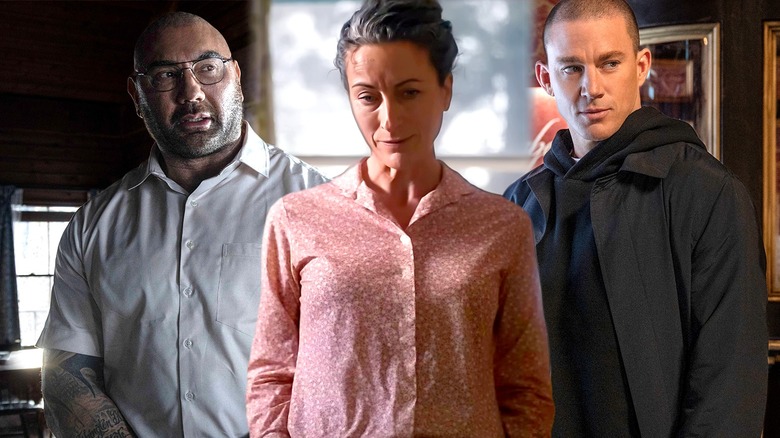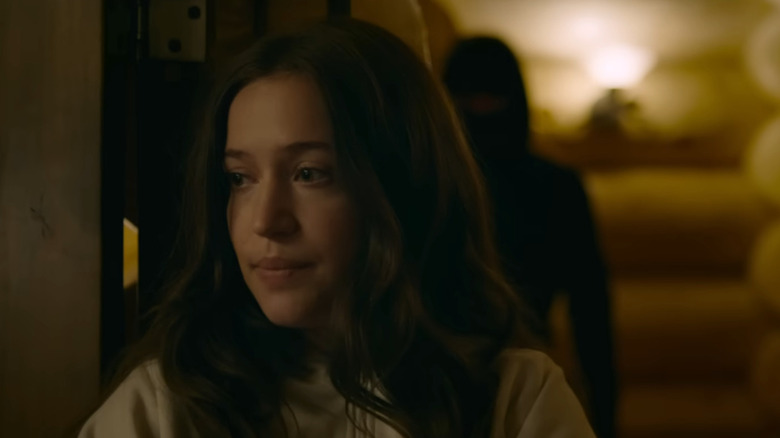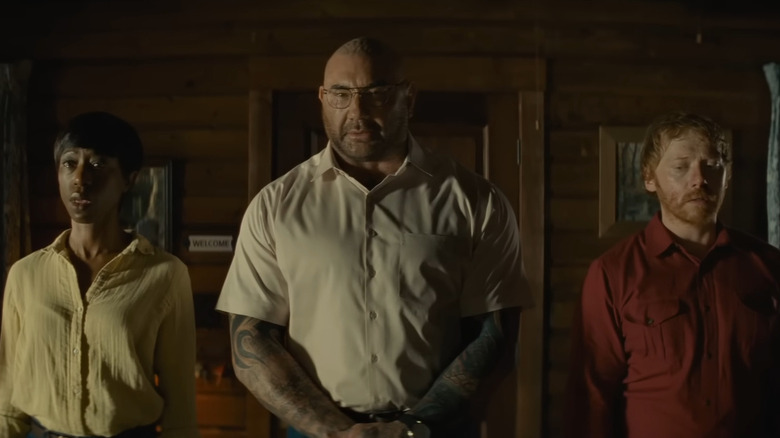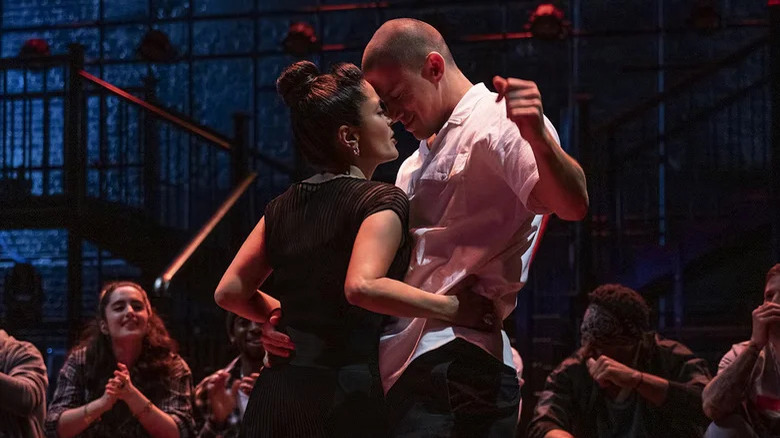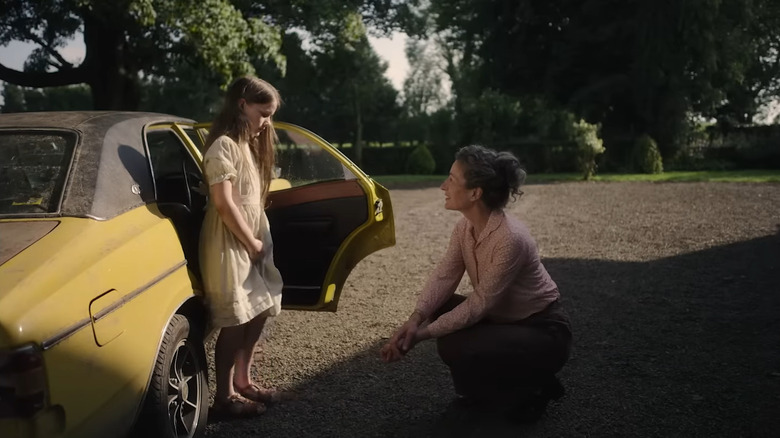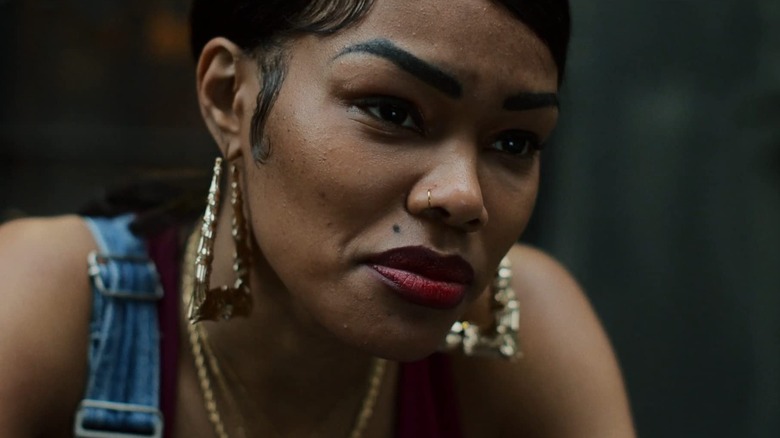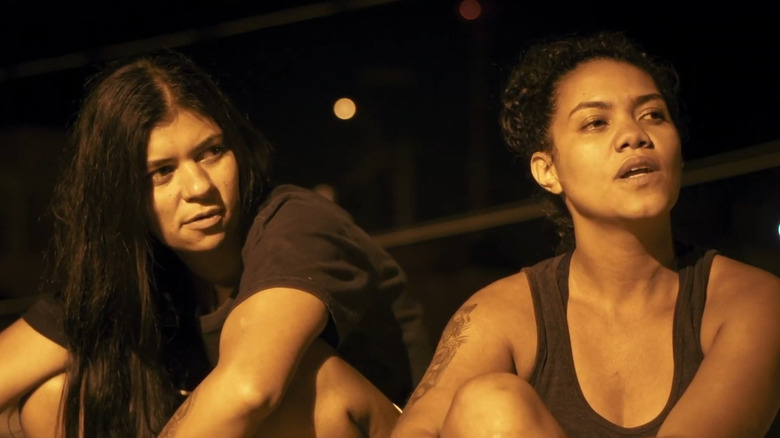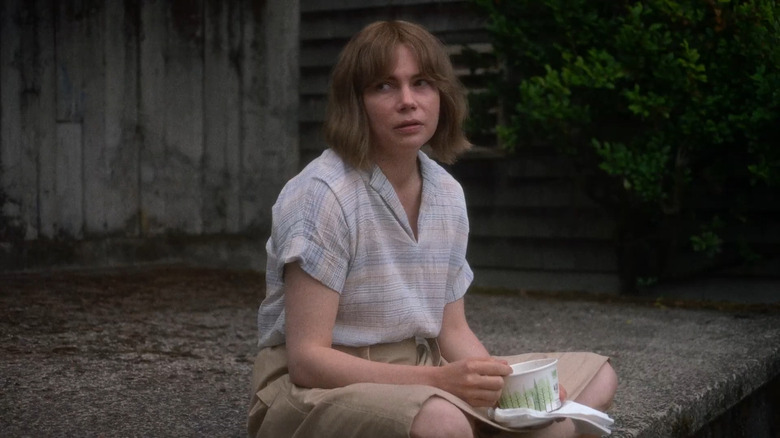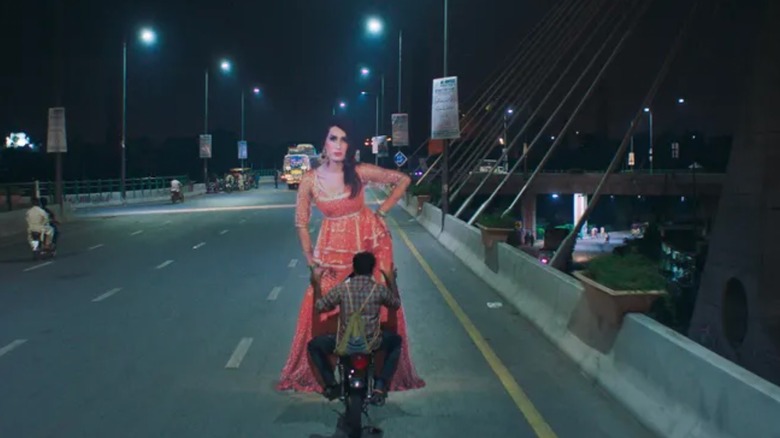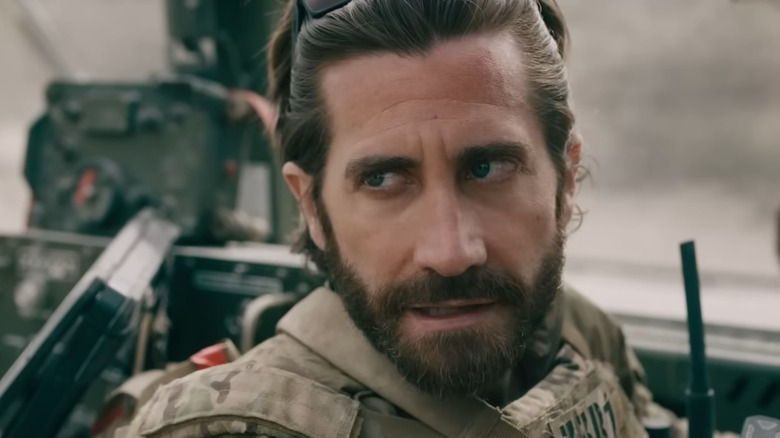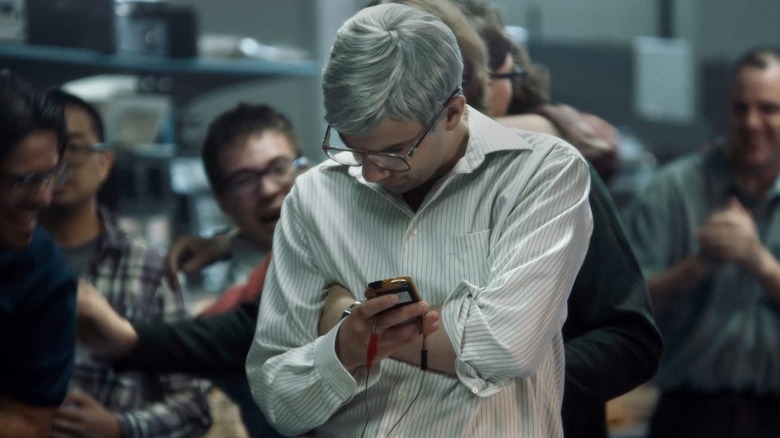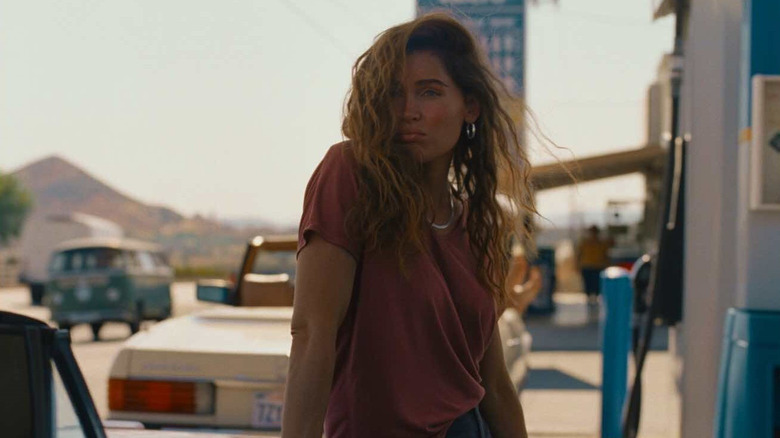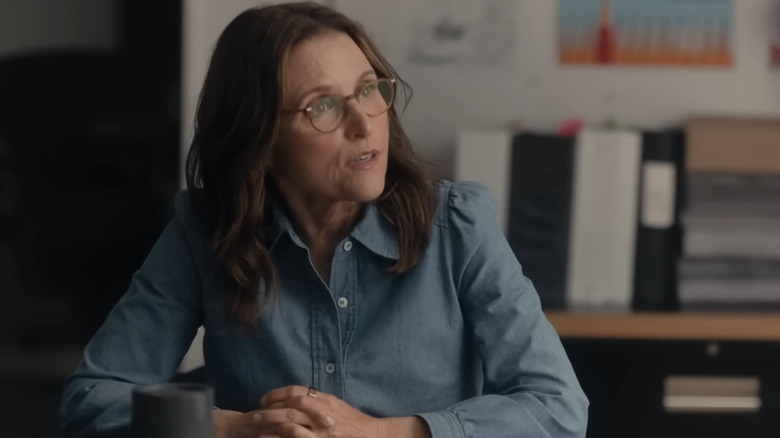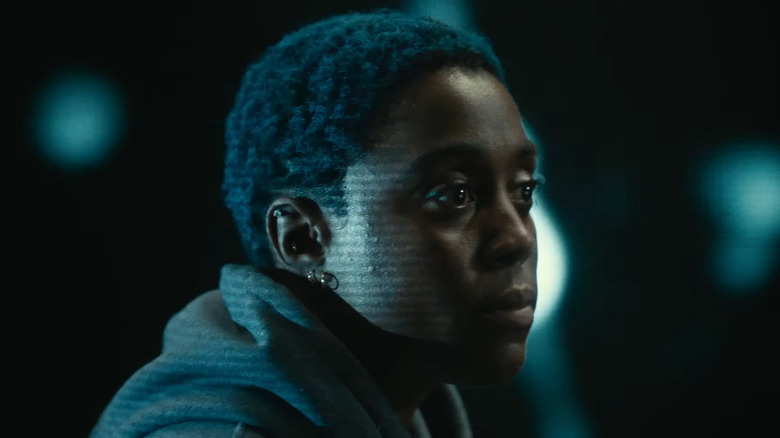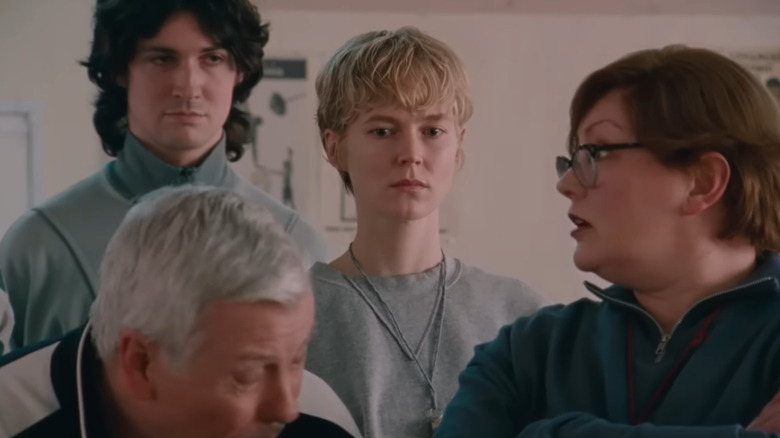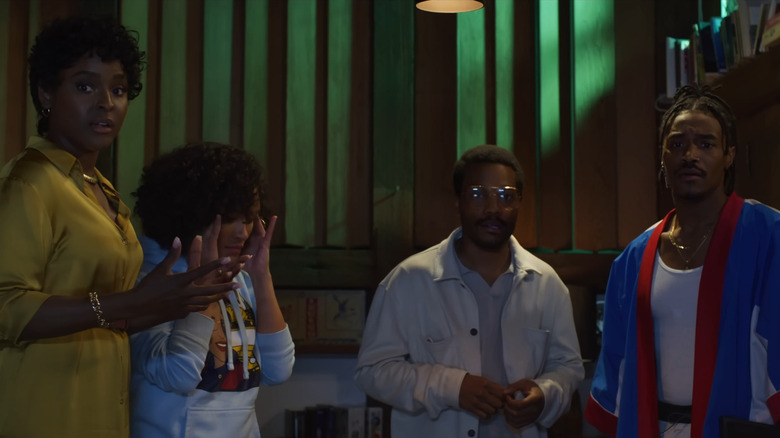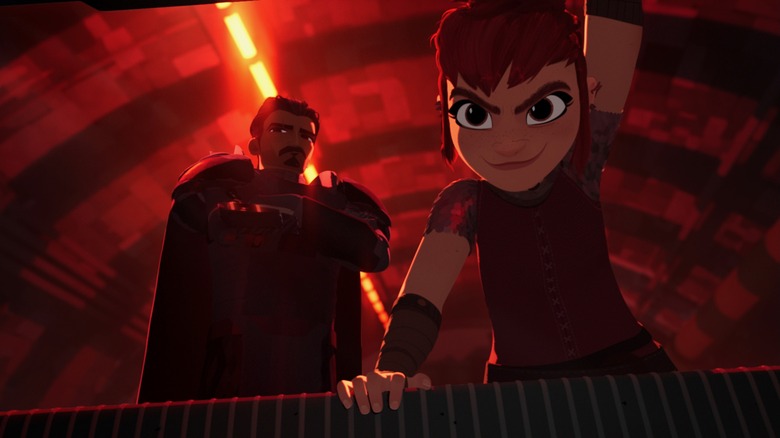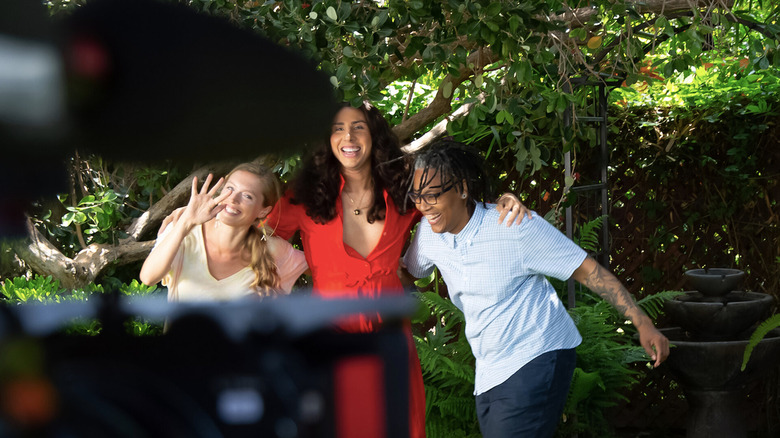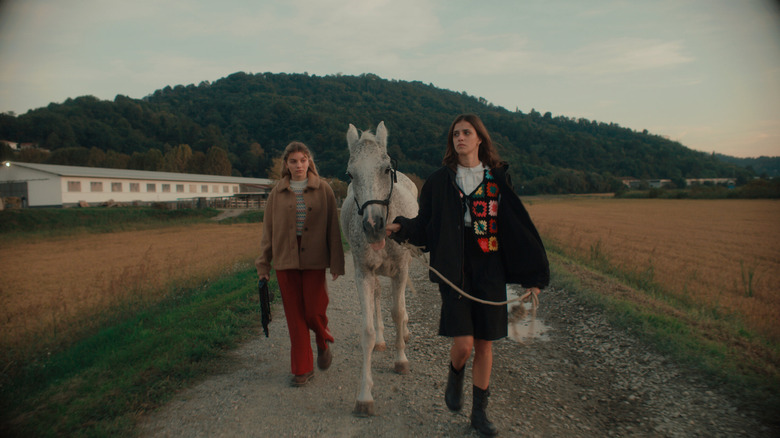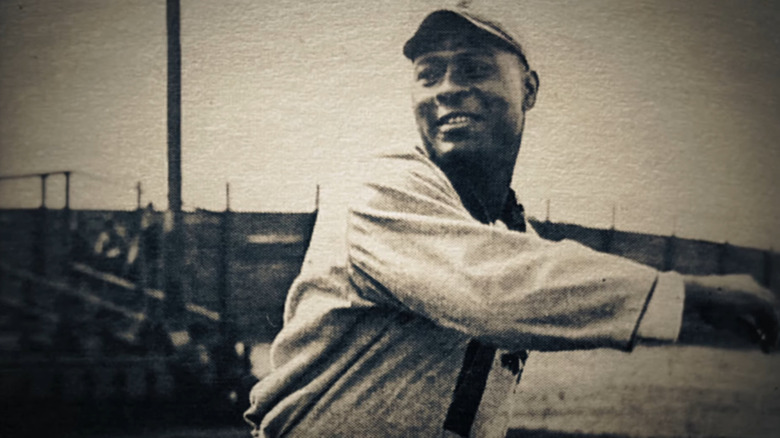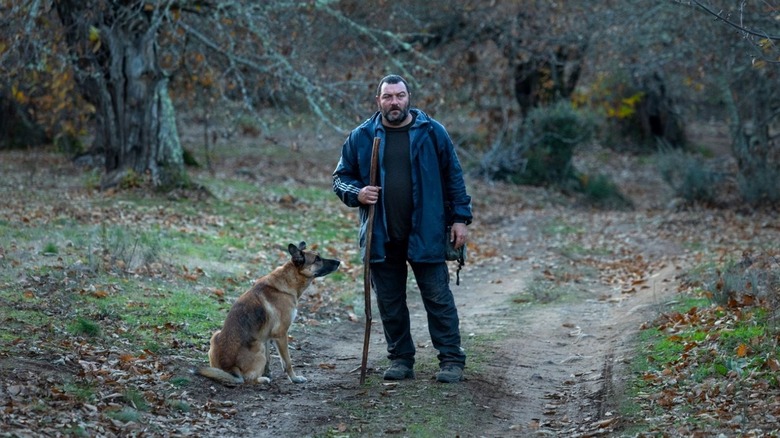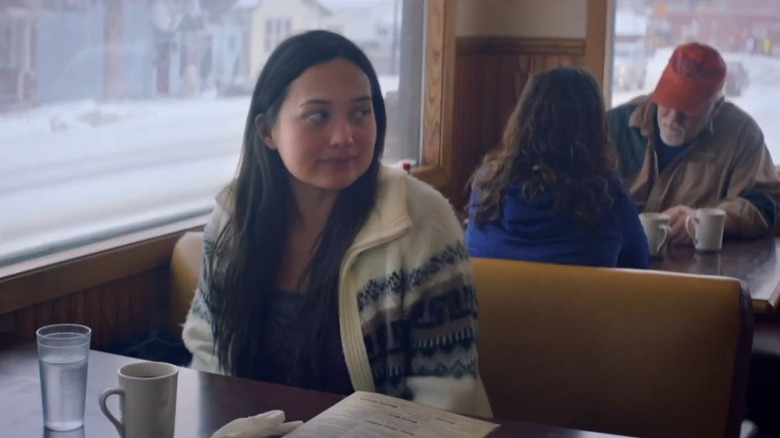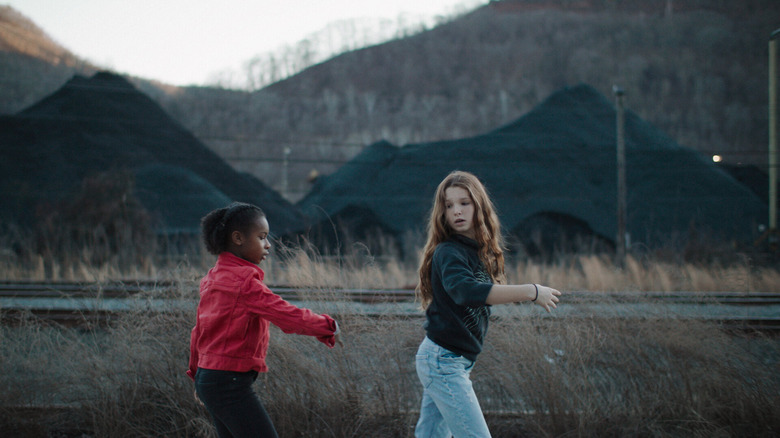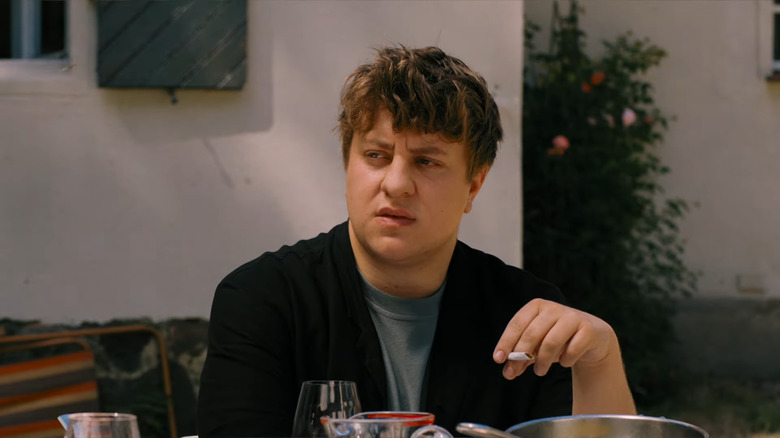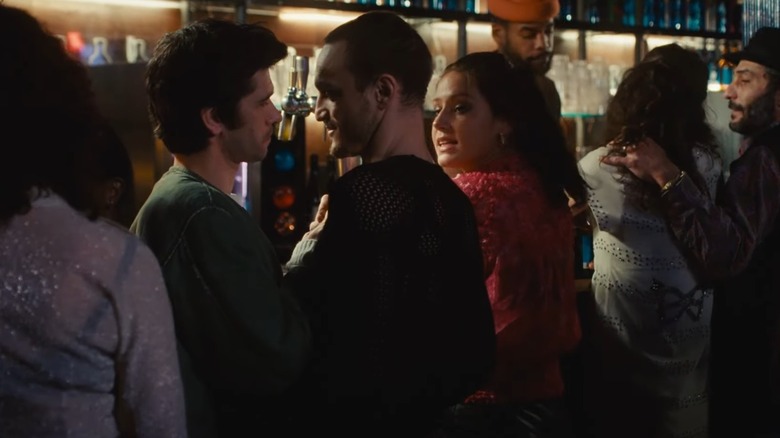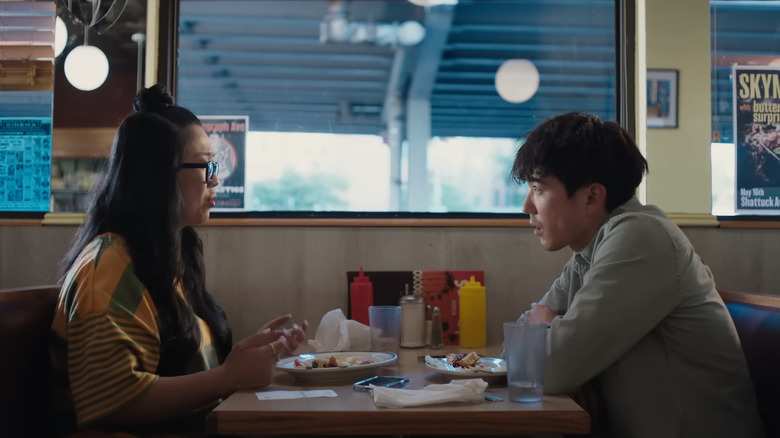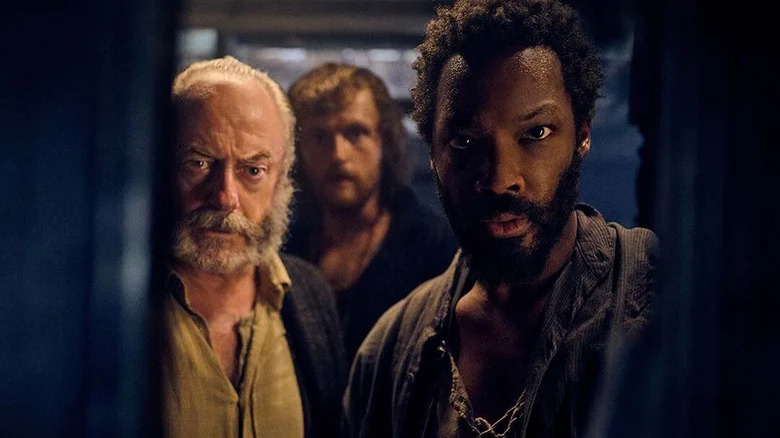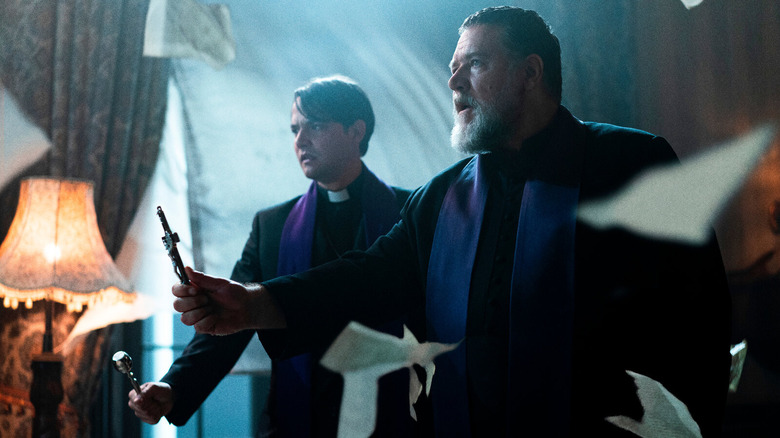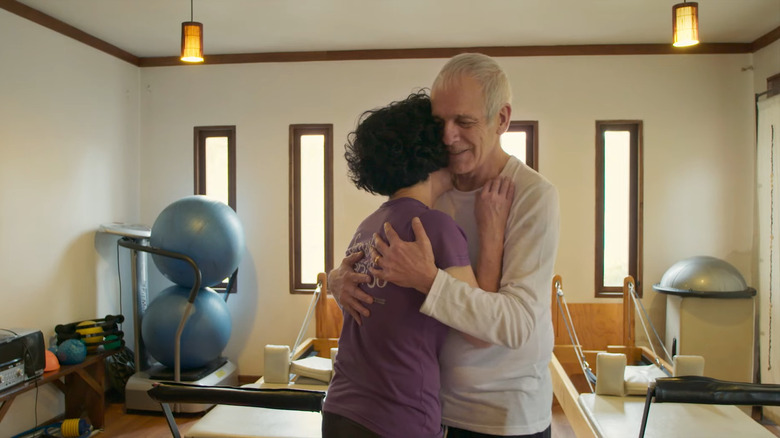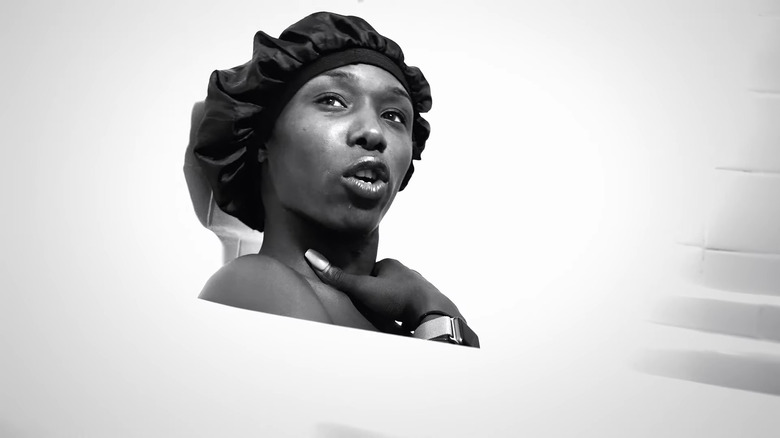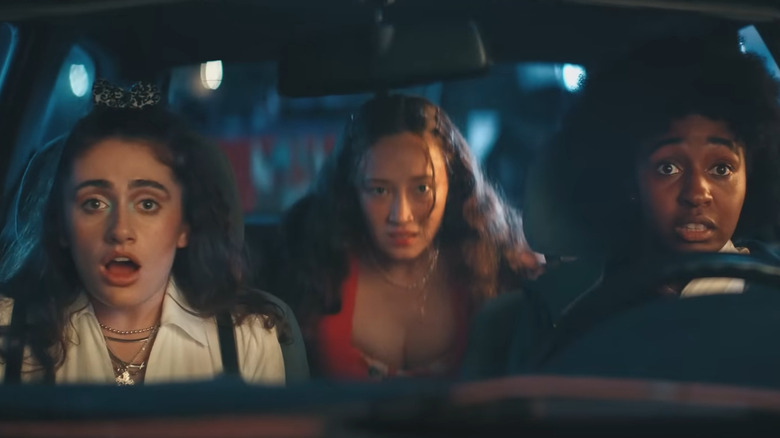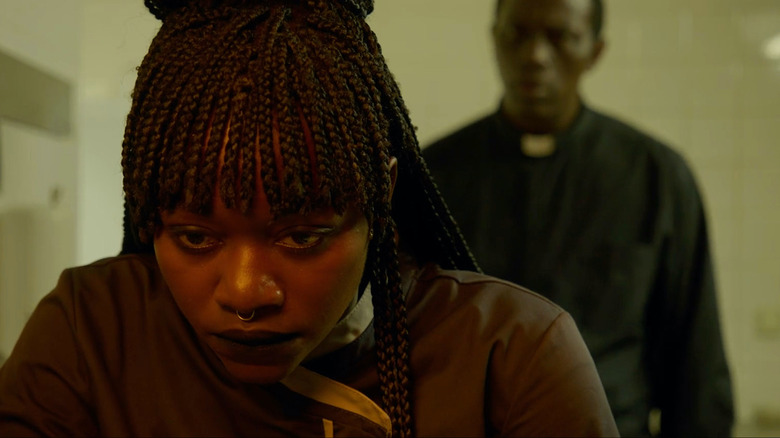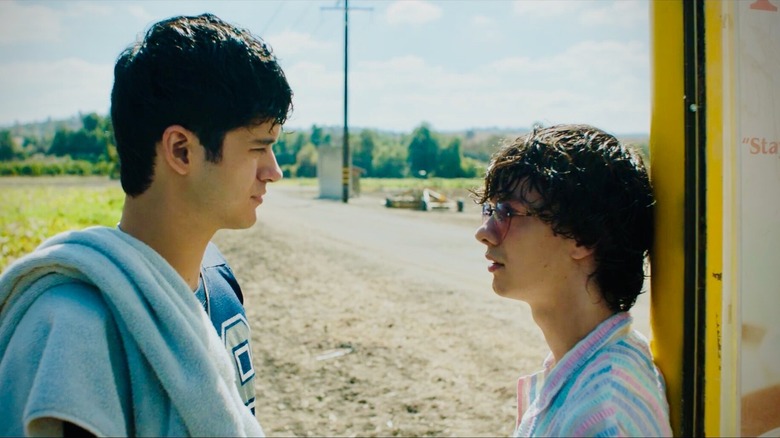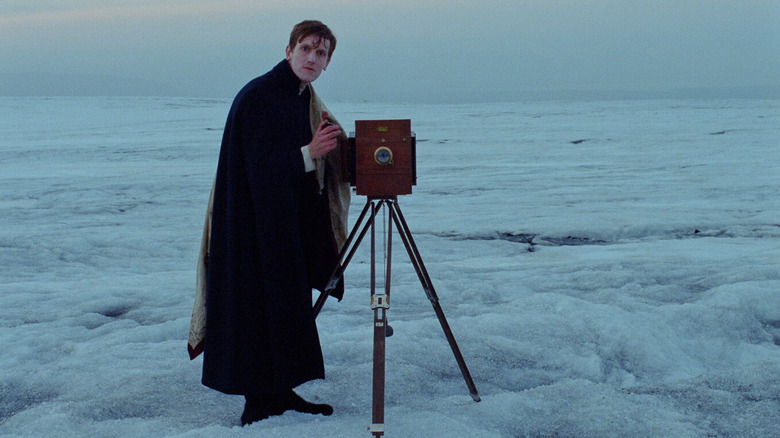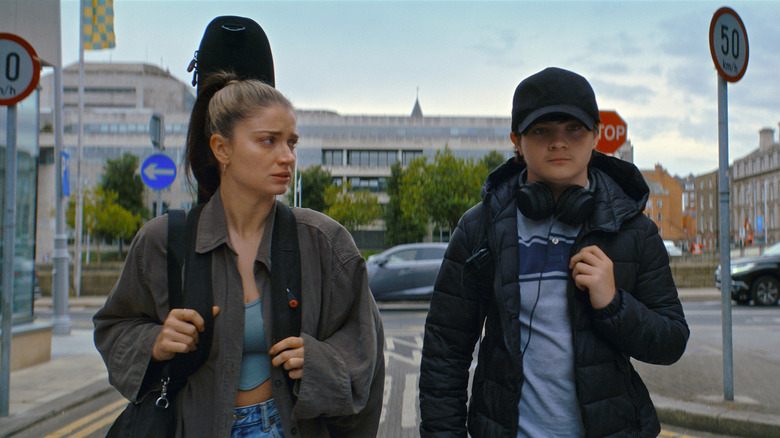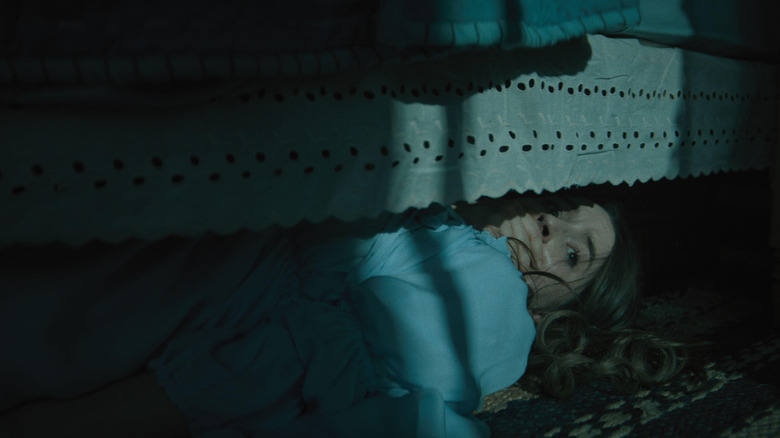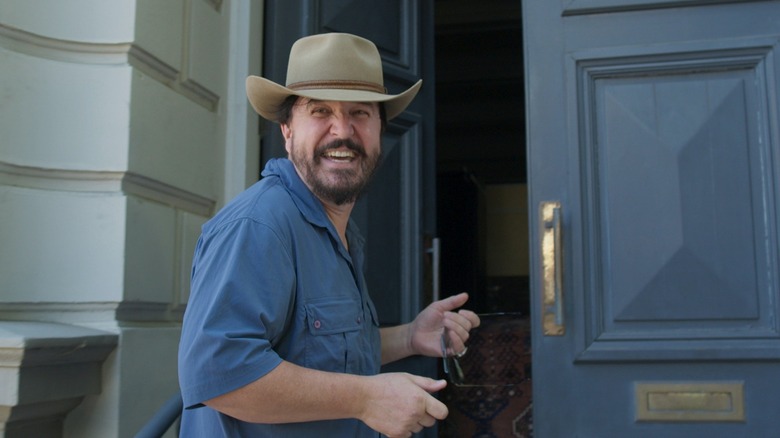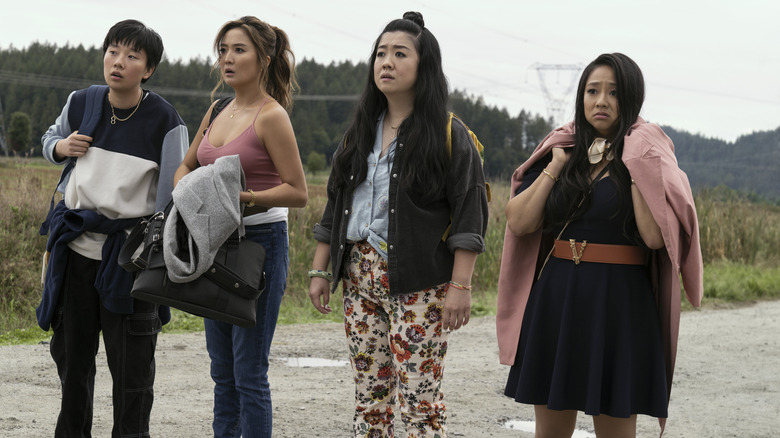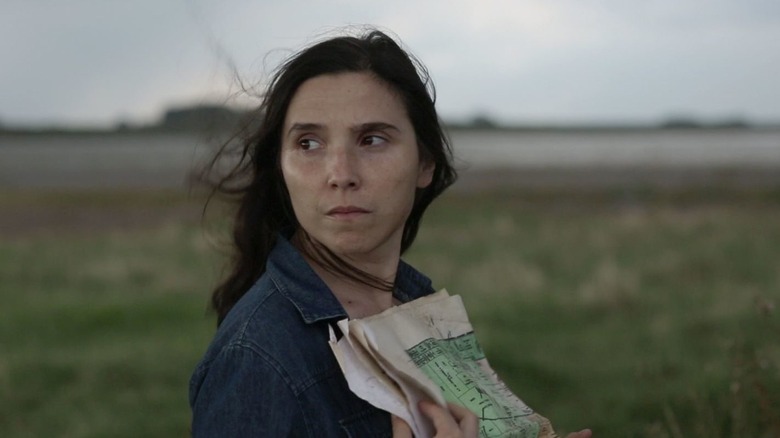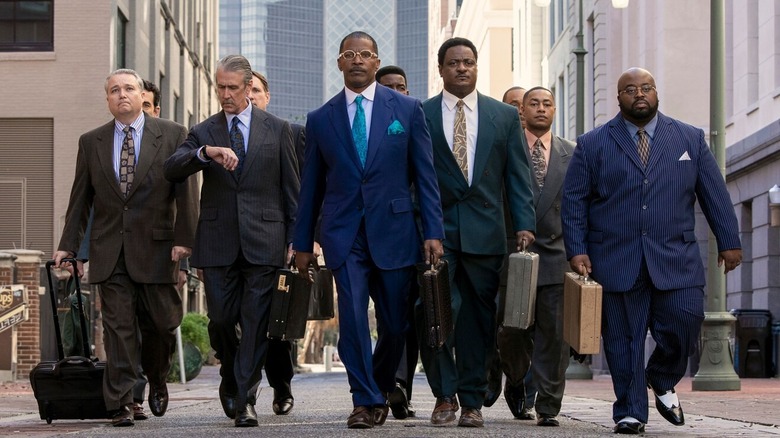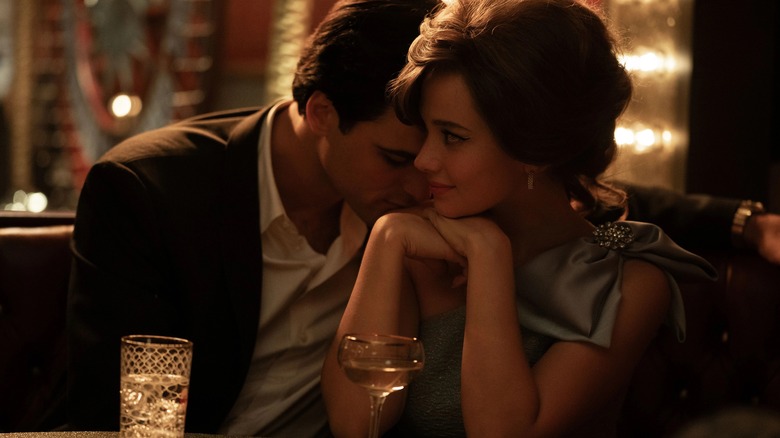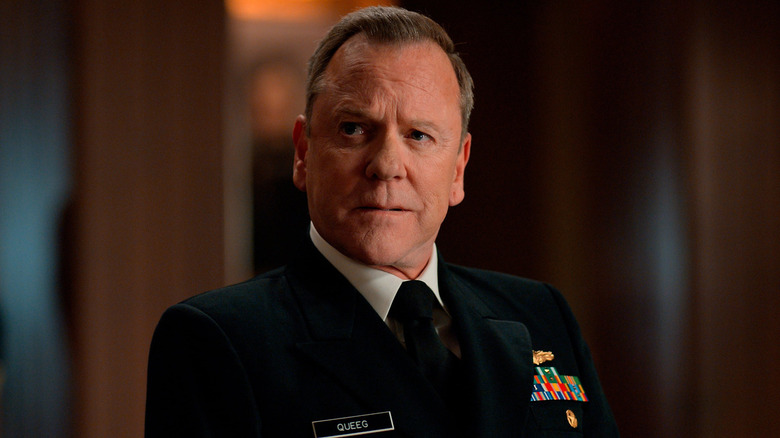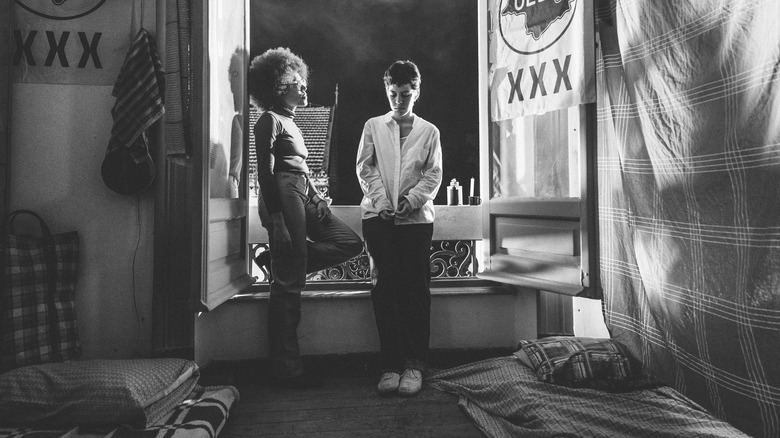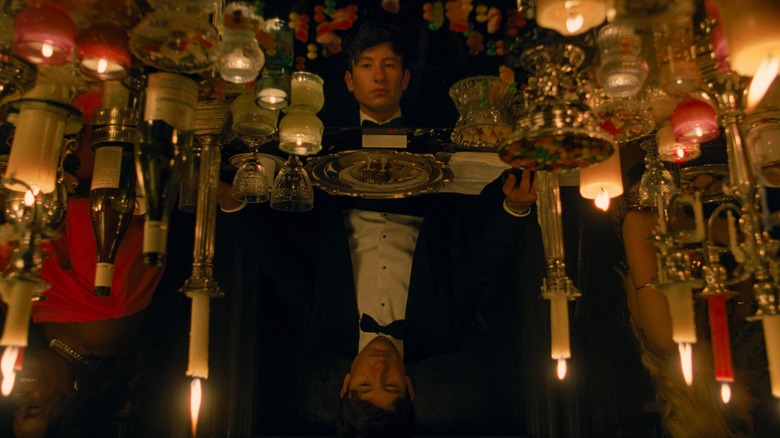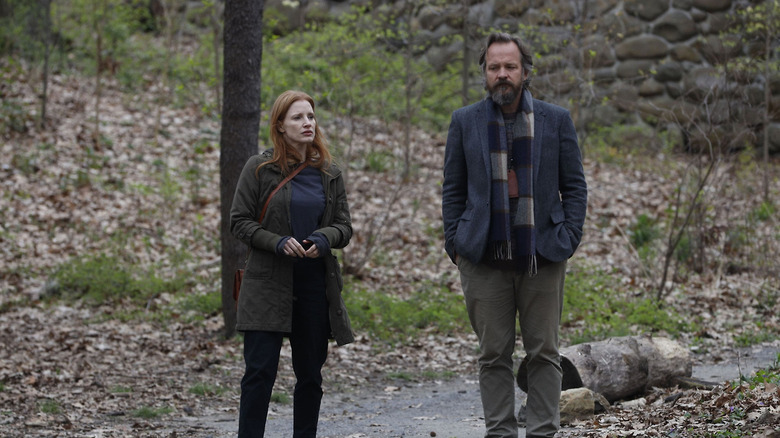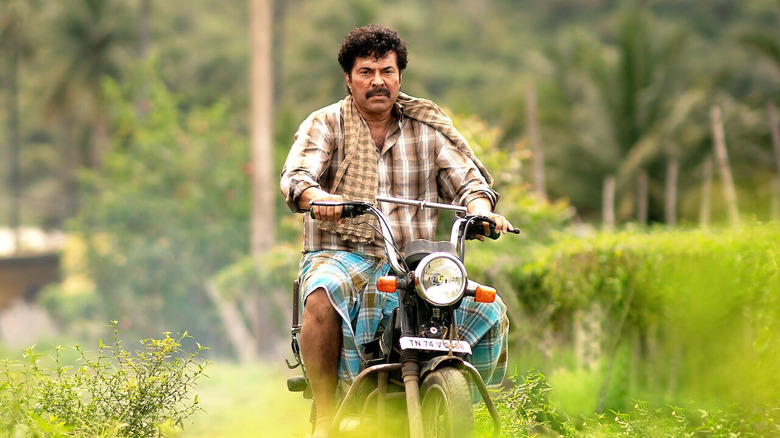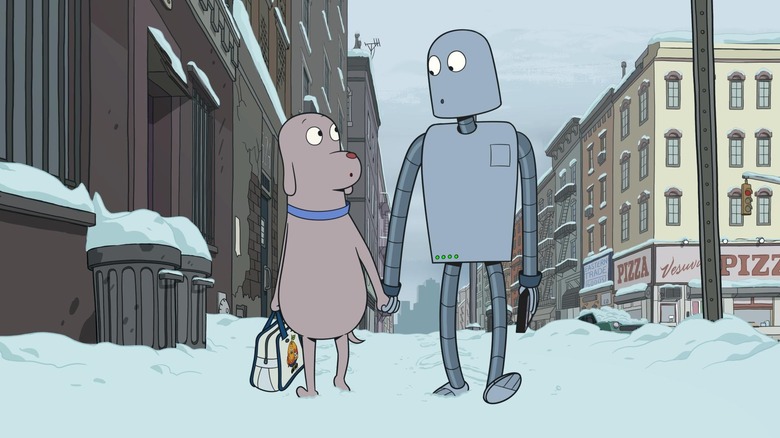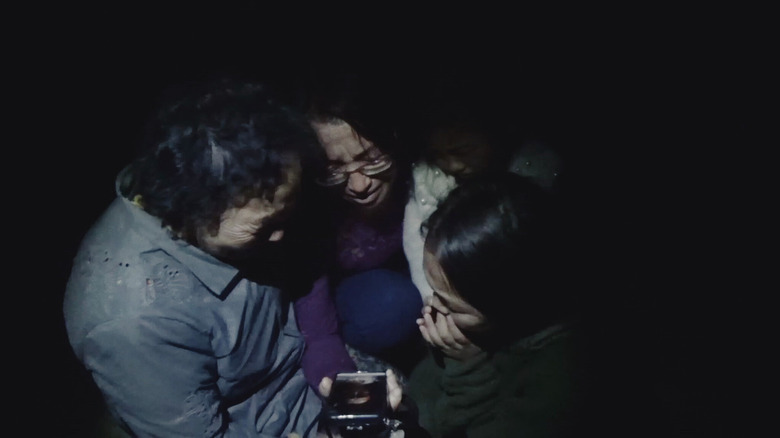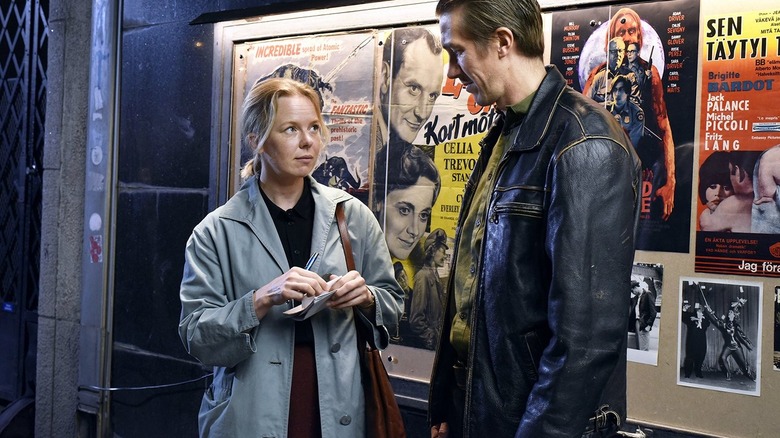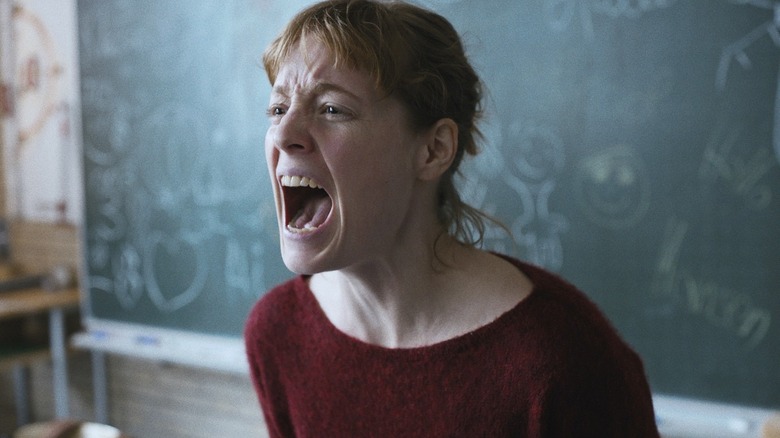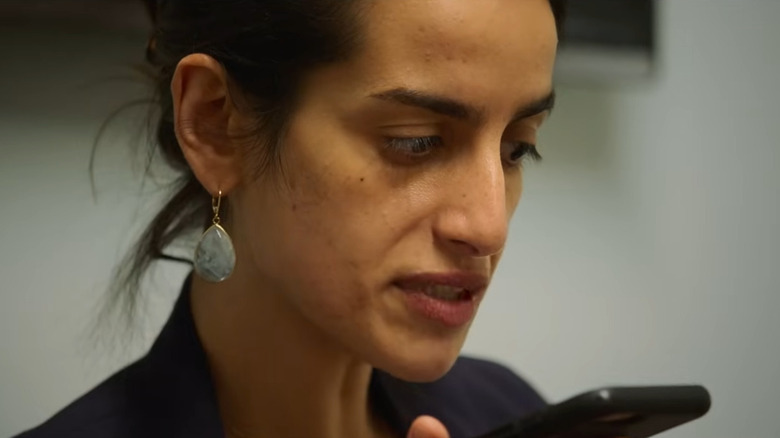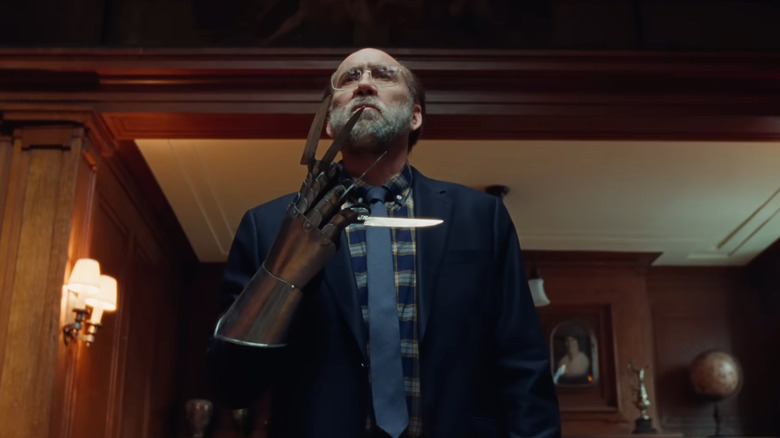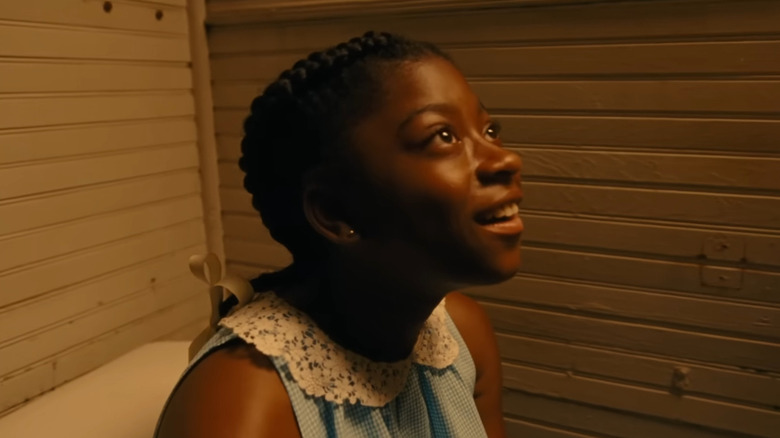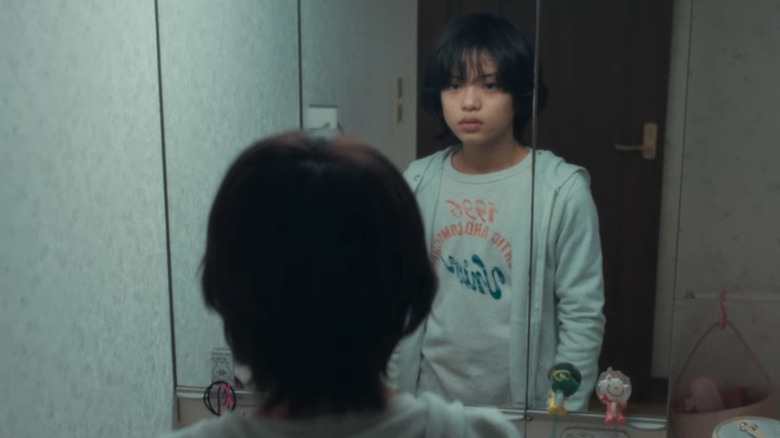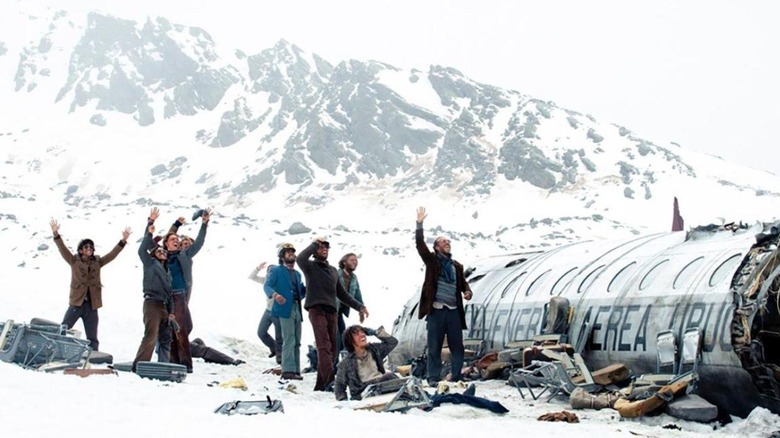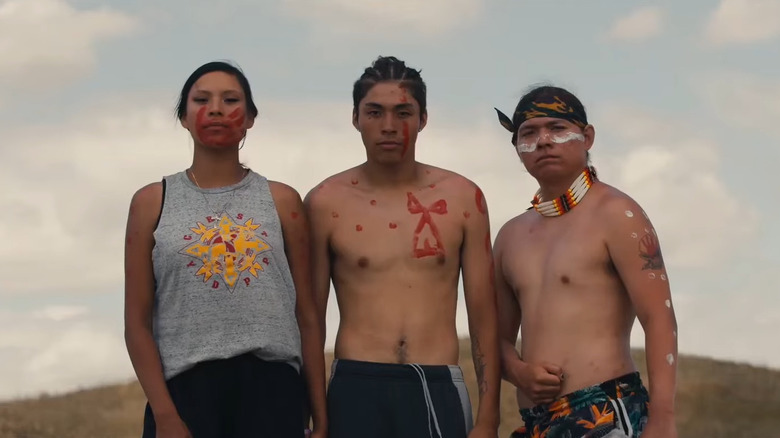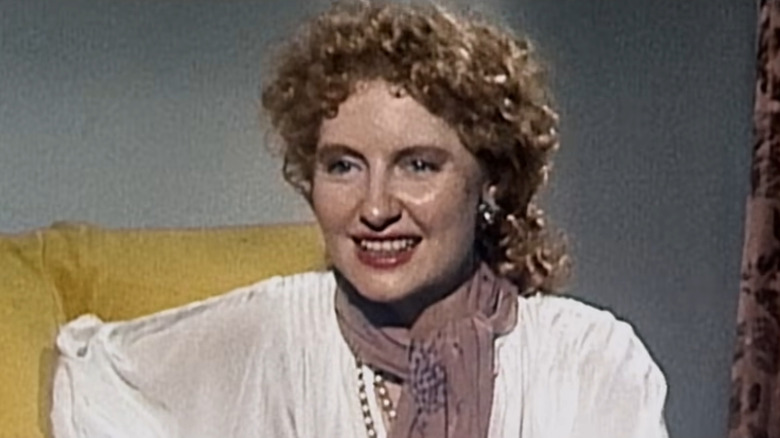The Most Underrated Movies Of 2023
The world of movies is often molded by its most famous occupants. Big award-season darlings or massive blockbusters are typically the motion pictures that influence the trajectory of the entire film industry. There are many masterpieces and enjoyable features within those two areas of cinematic expression, but let's not forget about the craftsmanship and skill apparent in movies that aren't quite as famous. Every year delivers movies that would be categorized as underseen gems, and though these titles aren't household names, that doesn't erase their artistic accomplishments.
In 2023, several underrated motion pictures have demonstrated that movies flying under the radar can be more powerful and memorable than you'd ever realize. It's a fact that reflects just how expansive the world of cinema is — there's always something new and exciting just waiting to be discovered out there. 2023's underrated titles underscore this impeccably with films ranging from a clever slasher feature to an unforgettable directorial debut to a romantic-comedy heads and shoulders above its modern contemporaries. It can be daunting to realize just how many underrated and remarkable movies are out there from filmmakers all across the world. But that fact should be exciting rather than intimidating, a vivid reminder that there's never a shortage of commendable artistry out there when you look beyond the biggest movies in the marketplace.
Updated on December 28, 2023: From chilling horror films to powerful documentaries, here are the most underrated movies of 2023.
Sick
Sometimes, it's staggering to consider how some quality movies slipped through the cracks of the general public. Other times, it's a lot more understandable why certain motion pictures never had a chance at securing widespread notoriety. Take the 2023 horror movie "Sick," which debuted not in theaters but on the streaming service Peacock. No wonder most people weren't able to watch and appreciate this movie considering its streaming home. While the release plan of "Sick" left something to be desired, the feature itself was a rock-solid piece of scary cinema. Written by Katelyn Crabb and "Scream" veteran Kevin Williamson and directed by John Hyams, "Sick" follows a pair of friends who head out to a lavish cabin during the COVID-19 pandemic only to end up stalked by a masked killer.
While other titles like "Locked Down" have crumbled under the weight of trying to make an appealing genre movie about the COVID-19 pandemic, "Sick" manages to demonstrate real creativity in these confines. Its most inspired touch is leaning into an innately stripped-down cast to really dig into the characters and the extended scary set pieces. A restrained scope just benefits "Sick" rather than taking it down. Plus, Hyams excels as a visualist here, with his lively camerawork adding tons to the tense atmosphere of this movie. Though it was buried away on Peacock, "Sick" deserved way more attention for its accomplishments.
Knock at the Cabin
"Knock at the Cabin" is not a flawless movie. Is any directorial effort from M. Night Shyamalan devoid of shortcomings? But save for the occasional total failure like "The Last Airbender" or "After Earth," Shyamalan's works being flawed are often a symptom of his admirably ambitious nature as a filmmaker. Shyamalan always shows up to challenge audiences, and his willingness to go for broke results in messy motion pictures that you also can't forget about. So it is with "Knock at the Cabin," an adaptation of the Paul G. Tremblay novel "The Cabin at the End of the World" that manages to deliver enough thrills to compensate for its weaker aspects.
For every line of dialogue or ham-fisted theological allusion that misses the mark, "Knock at the Cabin" cranks out an evocative image or an especially chilling detail reflecting what human beings are capable of in their most extreme moments of desperation. Best of all, this plot offers Dave Bautista a chance to further expand his talents as an actor. Playing a soft-spoken man who can comment on the educational value of a children's television show one moment before brutally slaughtering someone the next, Bautista is gripping throughout all of "Knock at the Cabin." His performance is one of several details in this thriller that flourish because of Shyamalan's creative tendencies. Those expecting a flawless motion picture should skip this one, but everyone else will find plenty in "Knock at the Cabin" to admire.
Magic Mike's Last Dance
Despite being a part of a franchise that previously made nearly $300 million worldwide across just two movies, "Magic Mike's Last Dance" came and went without leaving much of a pop culture impact in its theatrical release at the start of 2023. That's not hugely surprising given that the feature isn't quite as much of an extraordinary bolt out of the blue as "Magic Mike XXL" and its first two acts desperately needed an extra jolt of energy. But sometimes, a good finish is all that's necessary to make an evening memorable. In the case of "Magic Mike's Last Dance," its climax depicting a variety of lavish strip routines is plenty to boost the quality of the entire feature up a couple of notches.
Between the imaginative costumes, richly detailed choreography, and a dance routine that sees leading man Channing Tatum parading around with a lady in an interior rainstorm, "Magic Mike's Last Dance" caps this franchise off with a mighty bang. Plus, even before this unforgettable crescendo, "Last Dance" has its fair share of commendable attributes, including the film's willingness not just to retread the same kind of storylines explored in its predecessors. It doesn't hurt that Salma Hayek remains as magnetic of a performer as ever and a more than welcome addition to this franchise's cast. "Magic Mike's Last Dance" won't be everyone's cup of tea, but that final half-hour certainly works hard for the money and then some.
The Quiet Girl
The crop of Best International Feature nominees at the 95th Academy Awards left more than a bit to be desired, between contending films like the expansive but ultimately empty "All Quiet on the Western Front" and the derivative courtroom drama "Argentina, 1985." However, there was one gem among the five motion pictures in the form of the Irish drama "The Quiet Girl." Written and directed by Colm Bairéad, this production follows young girl Cáit (Catherine Clinch) leaving her crowded and troubled home to temporarily stay with much kinder relatives, Eibhlín (Carrie Crowley) and Seán Kinsella (Andrew Bennett).
"The Quiet Girl" has an appropriate title since it's a story all about subdued displays of emotion. But even the gentlest gestures and words can leave a mighty impact, as seen by how the various kind acts of the Kinsellas leave such a positive impression on Cáit. Bairéad's screenplay deftly and believably paints this trio of human beings coming closer together, with the surrogate mother/daughter relationship between Eibhlín and the film's protagonist being especially moving in how it forms. It's also a motion picture that matches rich emotions with equally striking imagery, as the Irish countryside looks gorgeous in the hands of cinematographer Kate McCullough. By the end of its runtime, "The Quiet Girl" will wring tears out of even the most jaded viewer. No wonder such an accomplished movie stood out so tremendously at this year's Oscars.
A Thousand and One
It's always remarkable to see a feature-length directorial debut just bursting with personality and skill. From the get-go, these artists demonstrate a commendable grasp of their artform and signal an exciting and promising future. Such is the case with A.V. Rockwell, who transitioned from short films to feature-length motion pictures with "A Thousand and One." Set over more than a decade in Harlem, the feature follows Inez de la Paz (Teyana Taylor) snatching her son, Terry (played by a trio of different actors at different points in time), from his foster home surroundings and trying to make a life for the two of them.
There are many great flourishes in Rockwell's directing here, including the way she frames every nook and cranny of Harlem with such affection and detail. But it's also impressive how she juggles such an expansive narrative without making "A Thousand and One" feel cramped or its characters come off as half-formed. Comprehensiveness doesn't mean trading out intimate details within the confines of this particular movie. Under her direction, unforgettable performances blossom like roses, with Teyana Taylor astonishing in her deeply complicated and compelling work as Inez while Josiah Cross' work as 17-year-old Terry produces some of the most devastating line deliveries of the entire feature. "A Thousand and One" is an incredibly rich depiction of a mother/child dynamic that would register as impressive under any circumstances. As Rockwell's feature-length directorial debut, though, it's especially outstanding.
Rye Lane
With "Rye Lane," we find yet another underrated 2023 movie that deserved better than getting dumped onto a streaming service. Since its North American premiere on Hulu, "Rye Lane" hasn't generated much in the way of conversation, which is a tragedy given what a delight this romantic comedy is. Like so many of the best entries in this genre, "Rye Lane" is a conceptually simple tale of two strangers, Yas (Vivian Oparah) and Dom (David Jonsson), stumbling onto each other and proceeding to spend the day together. Yas is boisterous, while Dom is withdrawn. They seem like total opposites, yet they can't stay away from one another.
This classical template is rejuvenated with all kinds of life thanks to the sparkling chemistry between Oparah and Jonsson. It also doesn't hurt that the movie itself looks gorgeous, with every backdrop of this London-set yarn bursting with vibrant hues of red, yellow, and blue. The vivid production design combined with the sharp camerawork makes "Rye Lane" as engaging visually as it is emotionally. On top of all that, director Raine Allen-Miller and writers Nathan Bryon and Tom Melia deliver an incredibly fun atmosphere filled with amusing lines of dialogue and equally entertaining plot turns. Any way you look at it, "Rye Lane" functions as an immensely enjoyable film that makes your heart swell. What a pity domestic moviegoers couldn't have experienced it on the big screen.
Dry Ground Burning
Cinema can be a powerful tool to reinforce the rhetoric of fascist oppressors, as seen by the works of D.W. Griffith or countless filmmakers behind Nazi propaganda films like Leni Riefenstahl. But it can also be a method for the marginalized to be shown as just everyday human beings, with the nonchalant depictions of humanity doing so much to undercut the sensationalist demonization of the oppressed.
So it is with "Dry Ground Burning," a new motion picture from filmmakers Joana Pimenta and Adirley Queirós set in Brazil that follows half-siblings Léa (Léa Alves Silva) and Chitara (Joana Darc Furtado) as they lead an all-ladies group determined to enact political revolution and secretly sell gasoline to motorcyclists. This is a movie that puts lesbian ex-convicts at the forefront of its narrative and backs up that bold narrative choice with equally audacious filmmaking.
While "Dry Ground Burning" has numerous references to former Brazilian president Jair Bolsonaro, its most striking qualities are ageless. Some of these are terrifyingly timeless, such as a chilling depiction of a group of cops preparing to hurt citizens by engaging in a nationalistic salute that looks an awful lot like a Nazi salute. Other times, the enduring qualities are much more pleasant and richly human, such as quiet scenes of Léa and Chitara just talking. By focusing so much on the latter qualities, "Dry Ground Burning" cements its impressive craftsmanship and reaffirms cinema's capabilities of lending dimensions to the downtrodden.
Showing Up
Kelly Reichardt wrung so much power out of a cow in "First Cow," so it shouldn't be a surprise that she also gets so much dramatic mileage out of a wounded pigeon in "Showing Up." This hurt critter is at the heart of many key scenes in this feature about cantankerous sculptor Lizzy (Michelle Williams), but it's by no means the only element at play here. "Showing Up" is a movie about the ordinary existence of Lizzy, with Reichardt's camera taking so much time to emphasize the humanity of every figure who wanders into the frame. Supporting figures like Lizzy's tormented brother, Sean (John Magaro), who could've been forgettable caricatures in other movies, are rendered with incredible depth.
The screenplay by Reichardt and Jon Raymond is also a pleasant surprise in just how amusing it is. "Showing Up" has lots of comedy to offer up audiences, particularly in the interactions between Lizzy and her busy landlord Jo (Hong Chau). The dissonance between Lizzy's insistence that she get her cold water back soon and Jo just riding back and forth on a tire swing is incredibly amusing. Subtle bursts of comedy like that exchange or the uncommented presence of a big fluffy dog lounging around Lizzy's workspace pepper the world of "Showing Up," which just helps to make it feel even more lived-in. Like so many of Reichardt's other works, "Showing Up" grabs your heart and attention effortlessly.
Joyland
Whether they realize it or not, the individual characters of "Joyland," a directorial effort from Saim Sadiq, are all trapped. Protagonist Haider (Ali Junejo) is pressured to get a job to provide for his family so that his wife, Mumtaz (Rasti Farooq), isn't the primary breadwinner of the family. Mumtaz, meanwhile, is yearning to maintain her financial independence and her current job in the face of perceptions of what women are "supposed" to do. The rare person to at least transcend some of the bonds of societal expectations is Biba (Alina Khan), a dancer whose both a trans woman and Haider's new employer.
In brief glimpses into Biba's personal life, including a scene where she walks through a location bustling with other trans ladies, we see the kind of joy that's possible when one is allowed to put their own identity first before "traditional" ideas of how people of certain genders are "supposed" to behave. The screenplay by Sadiq and Maggie Briggs deftly makes Biba represent this concept without turning her into an object or just a source of symbolism. She's still a richly-defined person, just like everyone else in the compelling cast of "Joyland."
These nuanced characters are told through captivating cinematography by Joe Saade, which frames everybody in a tight 1.33:1 aspect ratio. Through this visual detail, "Joyland" constantly reinforces the idea that these characters are trapped by societal expectations that often crush so many souls. Everyday confinement is at least beautifully realized in the hands of "Joyland."
Guy Ritchie's The Covenant
One look at the poster for "Guy Ritchie's The Covenant" will likely put a pit in the stomach of many viewers. At first glance, this movie looks like it has the potential to be another hollow and jingoistic motion picture about the Iraq War in the vein of "12 Strong" and "Lone Survivor." Thankfully, no uncomfortable Toby Keith needle drops disrupt the cinematic landscape of "The Covenant." In fact, the feature is a very well-crafted action drama concerning Master Sgt. John Kinley (Jake Gyllenhaal) is saved in Afghanistan by his interpreter, Ahmed (Dar Salim). After Kinley is sent back to America, Ahmed is left behind in the Middle East, spurring Kinley to lead a rescue mission.
The strongest section of "Guy Ritchie's The Covenant" is also its simplest and concerns a mid-movie stretch of the story where Kinley and Ahmed are on their own trying to make it across miles and miles of harsh terrain while being chased by the Taliban. Ritchie's filmmaking impresses in how well it musters up tension in smart ways while Salim's largely dialogue-free performance depicting Ahmed carrying the mortally wounded Kinley to safety is truly remarkable. Even with a more generic climax that ends up showcasing lots of American military hardware, "Guy Ritchie's The Covenant" maintains a somber tone and heavily emphasizes the compelling point-of-view of Ahmed. In other words, this movie is no rehash of "13 Hours: The Secret Soldiers of Benghazi."
BlackBerry
The BlackBerry phone was always going to be a temporary success. Not only is all technology prone to becoming tomorrow's outdated hardware, but when new co-CEO Jim Balsillie (Glenn Howerton) first walks into the ramshackle offices of the company behind this phone, the outfit's already millions of dollars in debt. The real-life exploits of BlackBerry creator Mike Lazaridis (Jay Baruchel) and his associates start out in the land of extreme farce, and things rarely get better for these people from there.
"BlackBerry's" upfront depiction of the innate problems that plagued this phone and especially the company that created it all make for a captivating yarn about good intentions gone awry. Writer/director Matt Johnson does superb work making the snowballing chaos of this company incredibly compelling, particularly when it comes to the moral decay of Lazaridis.
All this entertaining mayhem is told alongside a memorable score by Jay McCarrol, which features intense electronic influences that lend a sense of urgency to everything unfolding on-screen. This story is also lent extra heft by being executed in the hands of a strong cast, with Baruchel especially excelling in portraying the various ups and downs of Lazaridis, while Howerton is a force to be reckoned with as a CEO who'll bite your head off if given half the chance. All that rage couldn't make the BlackBerry phone stick around in the technology landscape ... but it does help accentuate all the entertainment packed into the movie "BlackBerry."
Monica
Going back to your childhood home as an adult is always a challenging experience. Even if you had a gloriously idyllic childhood, returning to your roots after spending so long carving out an independent life as an adult is such a surreal experience. For the titular lead of "Monica" (portrayed by Trace Lysette), going home is an especially arduous experience on many fronts, including the fact that her estranged mother, Eugenia (Patricia Clarkson), is slowly dying and losing her memory. On top of all that, Eugenia previously abandoned Monica once she discovered she was trans. There's endless conflict here that's kept Monica away for years. Now, she has to confront all of it under the most trying of circumstances.
While a lot is going on in the personal life of Monica, writer/director Andrea Pallaoro doesn't spoon-feed viewers everything that's happened in the personal life of this woman. Monica's existence is told through quiet, slow-paced storytelling that allows a tense atmosphere to properly take root and for the on-screen dynamics to feel authentic. These are people who've stewed in the past for so long that they're not going to talk about it endlessly in didactic expository dialogue. Monica and her relatives feel like real human beings, which means the aura of mystery surrounding them draws us closer. It doesn't hurt that Monica is portrayed through an unforgettable lead performance by Lysette. Even with everything else this feature has to offer, Lysette's work alone makes "Monica" a must-see.
You Hurt My Feelings
The summer of 2023 was packed with blockbusters that put the entire fate of the planet in jeopardy, but the Nicole Holofcener feature "You Hurt My Feelings" wrung gripping tension and terrific entertainment out of something as minuscule as communication difficulties between couples. Specifically, "You Hurt My Feelings" focuses on the strife that emerges when novelist Beth (Julia Louis-Dreyfus) overhears her husband, therapist Don (Tobias Menzies), revealing that he doesn't like Beth's most recent book. Considering that Don previously told Beth he loved this piece of writing, this revelation shakes Beth to her core.
From there, Holofcener finds glib humor in the imperfect dynamic between Beth and Don, the former of whom is content to stew in resentment over her husband's deception. While we're experiencing them, the smallest trials can feel Earth-shattering in how they impact us, and the comedy of "You Hurt My Feelings" nicely captures that. It's a premise that's also well-handled by a stellar cast, including a winning lead performance from Louis-Dreyfus and an incredibly memorable supporting turn from Michaela Watkins. If bloated summer 2023 blockbusters have got you feeling jaded, then there's no better time to experience the low-key charms of "You Hurt My Feelings."
Ear for Eye
At the end of 2018, debbie tucker green's play "Ear for Eye" began playing in the British theater scene. The play garnered enough acclaim and notoriety to be filmed and released as a standalone movie, also entitled "Ear for Eye." Cinema geeks around the world likely have a preconceived notion of what a filmed version of a play looks like, with many of these projects being very unimaginative shootings of live theatrical performances. That's not what green delivers with "Ear for Eye." Far from it. The movie version of "Ear for Eye" renders the wildly-varied testimonies and perspectives of its various characters in immersive, raw, and vivid terms. This is a piece of cinema that's captivatingly alive rather than something that makes you just wish you'd watched a certain show in person instead.
Everything about "Ear for Eye" immediately stands out as something incredibly unique, with debbie tucker green being as thoroughly committed to idiosyncratic imagery as she is to equally distinctive human beings. For instance, a contentious discussion between a professor and his student is framed against nebulously defined backgrounds that shift in hue based on the direction of the conversation. Meanwhile, the feature is anchored by a slew of unforgettable performances that just burst with so many vibrant emotions, with Lashana Lynch emerging as an especially memorable member of the cast. "Ear for Eye" utterly transcends its origins as a stage play to become essential modern cinema.
Blue Jean
In 1988, Jean (Rosy McEwen) is a P.E. teacher in Newcastle just going through the motions on a day-to-day basis. Jean is a closeted lesbian who keeps her identity deeply under her wraps unless she's hanging out with her fellow lesbians at a local gay bar. However, her personal and professional lives collide when a new student at Jean's school, Lois (Lucy Halliday), begins to go to the gay bar Jean frequents. Writer/director Georgia Oakley's "Blue Jean" subsequently becomes a cinematic representation of how systemically normalized bigotry can help turn members of marginalized groups on one another. Jean views quiet, stifled survival as a way forward and sees the presence of Lois, rather than the homophobic society itself, as the problem.
It's a compelling narrative and one that affords a queer woman protagonist the kind of morally complicated quandaries that such characters don't normally get to navigate in cinema. Oakley's quietly assured filmmaking vividly realizes the tension of the world Jean navigates daily while McEwen effortlessly communicates internal conflict within Jean just through a haunted facial expression. Meanwhile, the smart writing finds very creative and hideously authentic quiet ways that intolerance creeps into Jean's world, like a homophobic poster she drives by every day on her way to work. "Blue Jean" is an unflinching work and character study, but it's all the better for its willingness to keep the camera rolling on complicated lives navigating omnipresent prejudice.
The Blackening
When one says the word "spoof movies," visions of "Meet the Spartans" and "Date Movie" immediately dance across the mind. This is a subgenre that does not have a good reputation in the modern world and for good reason. Thankfully, "The Blackening" is here to provide a counterpoint to all the dreadful examples of 21st-century parody films. For one thing, its focuses on poking fun at tropes of one specific genre (horror features) rather than going the "Disaster Movie" route of just overwhelming you with modern pop culture references. The result is a more concise motion picture that relies on quality standalone gags rather than just half-hearted nods to things audiences are familiar with.
Even better, "The Blackening" is anchored by a bevy of memorable lead performances across its ensemble cast. Best among these turns is X Mayo as Shanika, a performance that's chock-full of exquisite line deliveries, and a lively performance from screenwriter Dewayne Perkins as Dewayne. Watching these actors simply bounce off one another and exchange witty dialogue is already a treat. The fact that director Tim Story also delivers clever subversions of hallmark horror narratives is just a most welcome bonus. Needless to say, "The Blackening" is a drastic improvement on typical subpar modern spoof comedies.
Nimona
Many types of movies get the short end of the stick when it comes to getting dropped on Netflix, but one type of cinema is truly ill-served by this streamer: animated family movies. Whereas theatrical animated features like "Puss in Boots: The Last Wish" or "Elemental" can have underwhelming debuts but leg it out over multiple months, new animated Netflix movies seem to vanish the moment they hit the platform. That's a tragedy under any circumstances, but it's especially a pain when it comes to "Nimona," a feature film adaptation of N.D. Stevenson's graphic novel of the same name.
The story of a shapeshifter named Nimona (Chloe Grace Moretz) who teams up with Ballister, a knight framed for murder (Riz Ahmed), "Nimona" has energy to spare both in its wonderfully frantic animation and live-wire gags. However, it really excels in terms of pathos. The film's depiction of what it means to live life as a societal outsider resonates as truly authentic, despite all the fantastical story elements at play. Plus, the voice work is terrific from top to bottom, with Ahmed and Moretz both turning in exceptional work in the lead roles. A movie as good as "Nimona" really deserves the big-screen treatment so that everyone can discover it, but hey — at least a film this unique and delightful exists at all.
Every Body
Some of the most moving moments of 2023 are contained in "Every Body." Consider its camcorder footage of a 1996 meeting of the intersex community at an outdoor picnic. At this event, individuals who've spent much of their lives being told to smother their identity can be out, proud, and around their peers. During this social gathering, one member of the group notes that they know this isn't the end of intersex community advocacy — it's just the beginning. That propulsive and richly human spirit courses through every moment of the incredibly compelling documentary "Every Body."
"Every Body" director Julie Cohen largely focuses on a trio of intersex individuals — Sean Saifa Wall, Alicia Roth, and Weigel River Gallo — who all navigate modern life in various parts of the world. While their struggles (in realms ranging from dating to advocating for themselves in local politics) are apparent on screen, "Every Body" doesn't sensationalize the daily existence of intersex folks. Cohen's intimate approach captures low-key moments like Alicia cleaning up her apartment after a long day at work, and members of this community happily coming up with protest slogans. Taking time to focus on these moments within "Every Body" emphasizes how nuanced the lives of intersex people truly are, and lives up to the ideals expressed at that glorious 1996 picnic.
Amanda
Who is Amanda (Benedetta Porcaroli)? The titular star of writer-director Carolina Cavalli's feature "Amanda" belongs to an incredibly rich family and struggles to think beyond herself. Even her impromptu quest to become the best friend of shut-in Rebecca (Galatéa Bellugi) is laced with self-serving attributes. She's a messy figure, but her flaws are also emblematic of the sense of loss many of us feel in our 20s. Even when it seems like your life has been handed to you on a silver platter, deep internal torment can make you feel adrift and resentful of everyone around you.
Cavalli's portrayal of Amanda is wonderfully intricate, while Cavalli's filmmaking style encompasses a variety of tones. "Amanda" begins with anarchic camerawork, particularly with the film's intentionally tardy title card. Later, though, as Amanda and Rebecca actually begin to bond, a degree of warmth begins to seep in (sprinkled with chaos, as seen through the duo's use of fireworks). Life takes you on all kinds of wild ups and downs. "Amanda," both in its visuals and themes, captures these unpredictable qualities of existence with aplomb.
The League
Civil rights advocacy stretches across centuries and into multiple fields, including the world of baseball. Sam Pollard's documentary "The League" explores this through the history of the Negro Baseball League. Black players were forbidden from joining teams with white baseball players in the late 1800s, thus prompting the creation of the League. Here was a domain run by Black people for Black communities, which gave Black baseball legends a chance to be seen.
"The League" compellingly relates this history, and informs viewers of lesser-known figures scattered throughout the sport. They may not be household names like Babe Ruth, but these men and women's stories are very much worth telling. Interview segments with modern-day figures like Andrea Williams and archival footage of anecdotes delivered by the likes of Maya Angelou makes an already engrossing story even more transfixing. Pollard, who previously helmed the exceptional feature "MLK/FBI," delivers another remarkable documentary with "The League."
The Beasts
Antoine (Denis Ménochet), lead character of "The Beasts," doesn't want trouble. He and his wife Olga (Marina Foïs) are French natives who live on a farm in Galicia, Spain, and try their best to take care of the environment. However, their refusal to have their countryside sold to a wealthy wind energy outfit puts them at odds with local townsfolk. Most notably, next-door neighbors Xan (Luis Zahera) and Lorenzo (Diego Anido) are enraged at losing out on selling their farmland. What results is a gripping thriller, in which Antoine must navigate daily existence and the increasingly malicious behavior of his neighbors.
To say "The Beasts" is a captivating work of cinema isn't enough. Writer-director Rodrigo Sorogoyen places the viewer inside a societal outsider viewed as "the enemy" by fellow working-class people, rather than the actually dangerous wealthy members of society. This misplaced anger on Xan and Lorenzo's part also adds a sense of tragedy to their characters — but this doesn't make their increasing hostility towards Antoine and Olga any less terrifying. The movie's measured camerawork captures several harrowing situations with incredible mastery, while the script isn't afraid to get dark depicting the struggles immigrants face in securing justice. Far from an easy watch, "The Beasts" is an essential piece of 2023 cinema.
The Unknown Country
As "The Unknown Country" begins, the camera breaks away from protagonist Tana (Lily Gladstone) to explore the internal life of an older waitress. She provides narration about her life and her interest in rescuing abandoned cats, while the viewer sees footage of her at home, snuggling her felines. This digression is more important than it initially seems, as it establishes a pattern of pausing for brief detours into the seemingly throwaway characters Tana encounters. Everyone from Tana's sister to a convenience store clerk to a motel manager has a story worth sharing.
This empathetic gaze underscores "The Unknown Country," which pairs its focus on overlooked souls with loving camerawork, which captures Texas backdrops rarely seen, even in indie cinema. This is a movie about the ignored (particularly indigenous people), and they're well-served by director Morrisa Maltz's filmmaking style. "The Unknown Country" also functions as a fantastic showcase for Lily Gladstone. The role of Tana is a restrained one that makes use of minimal dialogue. Gladstone keeps you glued to the screen with nothing but her facial expressions. She is the beating heart of "The Unknown Country."
King Coal
Coal. A single rock can hold so much power, especially over territories where one can dig for it. Director Elaine McMillion Sheldon returns to her home of Central Appalachia to explore the power coal and corporate greed have over working-class life with the documentary "King Coal." There's a dark urgency underpinning the proceedings given how much reliance on the coal industry and corporate interference has ravaged the communities sitting atop hordes of coal. However, the dominant aesthetic of the piece is much more languid, which helps to demonstrate how the adverse side effects of coal dependency have slowly but surely taken their toll on small towns and people.
At times, "King Coal" is a therapeutic cinematic exercise, as individuals who've often had their voices erased entirely (chiefly Black residents of Central Appalachia) finally get to have their perspectives captured on film. However, the entire feature carries a deeply nuanced quality that renders its on-camera subjects as actual human beings, a sharp contrast to the way corporations (which only want to exploit the area's coal, safety be darned) treat these individuals. For some, "King Coal" may be too slow-paced to be worth getting invested in. However, patient and observant viewers will be richly rewarded with a documentary that takes a stark gaze onto the present coal-centric communities and attempts to imagine a brighter future for these areas.
Afire
There's always a looming fire in the distant background of "Afire," the latest film from writer/director Christian Petzold. That blaze rages on near the vacation home of Leon (Thomas Schubert), a writer who's frantic over his newest manuscript. It doesn't help that Nadja (Paula Beer) — a woman that Leon feels some sort of attachment to but is also incredibly adversarial with — is now his unexpected guest.
As tensions escalate between these two — and Leon's best friend Felix (Langston Uibel) begins a romance with David (Enno Trebs) — grave trouble feels as imminent as the encroaching presence of that wildfire. Petzold's greatest trick in writing "Afire" is committing deeply to making Leon super unlikeable but also constantly showing him getting one-upped or overshadowed by other characters. He's intentionally insufferable, but viewers are always aware that some form of comeuppance isn't far behind.
Similarly, the script is wise to keep its scope so intimate, especially since the central performers thrive in such low-key confines. Paula Beer especially impresses in peeling back new captivating layers of personality within Nadja as the film progresses. Meanwhile, sharp visuals from cinematographer Hans Fromm inform a sense of quiet dread into every conversation and activity without overwhelming the naturalism of the entire feature. As its title would indicate, "Afire" does indeed involve a wildfire, but what's really dangerous in this gripping drama is simmering animosity between people.
Before, Now & Then
"Before, Now & Then" protagonist Nana (Happy Salma) cannot stop living in the past. Her time in the present is marked by vivid memories of her husband's murder during an uprising in the past. However, eventually, Nana must awaken and navigate her life in Indonesia in the late 1960s. This new existence includes striking up a dynamic with Ino (Laura Basuki), the lady Nana's husband was sleeping with. Other movies might have Nana and Ino immediately at each other's throats over a man. Instead, the duo find tender comfort in the other's arms as they finally have somebody to talk to, to listen to, and to be free around. A moment where the pair jump off a small cliff and into a pool of water is downright exhilarating, the freedom they share is palpable.
Writer/director Kamila Andini handles this central relationship well, and her strong visual sensibilities capture the quiet aching torment of Nana's everyday life, especially whenever she's dealing with intrusive visions of the past. Just as restrained and effective is the lead performance of Happy Salma — she's mesmerizing in the lead role even when her dialogue is minimal. Salma's subdued physicality conveys a lot about the torment Nana is burying deep inside her body, and the way she subtly communicates Nana being more relaxed around Ino is truly impressive. "Before, Now & Then" is a striking yarn about the ways our past and present are always intertwined.
Passages
If you've been understandably yearning for some memorable sex scenes in the modern cinematic landscape (which is often more interested in nostalgic fan service than boning), the new Ira Sachs film "Passages" has got some great sequences for you. This feature concerns the incredibly toxic filmmaker Tomas (Franz Rogowski) leaving his husband Martin (Ben Whishaw) for a woman named Agatha (Adèle Exarchopoulos), and all that relationship drama inevitably leads to some bedroom action. Sachs keeps his camera at a bit of a distance in capturing the bodies of Tomas and Agatha or Tomas and Martin meshed together while also framing these intimate encounters in lengthy static shots. There aren't grand external embellishments to these sex scenes. Sachs wants the viewer to focus on the graphic physicality at hand and the raw emotions underpinning these experiences.
"Passages" certainly delivers the goods on visually striking sex scenes while also proving an engaging exercise even when the characters are all keeping their clothes on. It's especially impressive how much of a realistic monster Tomas is allowed to be, a flawed character queer men aren't often allowed to inhabit without the narrative focusing exclusively on cis-het people. Meanwhile, Ben Whishaw reaffirms his status as the champion of quiet performances jam-packed with tons of power. Come for the compelling sex scenes in "Passages," stay for the remarkable performances and camerawork.
Shortcomings
"Shortcomings," the feature-length directorial debut of comedic actor Randall Park, is a reminder that movies with very noticeable flaws can also be deeply worthy of praise. There's no denying "Shortcomings" often has a very unimaginative visual palette while its final five minutes wrap things up in too tidy of a fashion. However, there's far more we can laud here, including Adrian Tomine's screenplay (adapted from his graphic novel of the same name) delivering a thoroughly and intentionally unlikeable protagonist named Ben (Justin H. Min).
In a delightful 360-degree turnaround from his work in "After Yang," Min is downright repellant at times as Ben, and that's a testament to his great work in the role. Within Min's acting, viewers witness the sort of flawed lead character Asian-American actors aren't often allowed to play. Adam Driver and Robert Pattinson can play monsters and score award-season accolades, but those kinds of roles aren't often afforded to actors who look like Justin H. Min.
The larger metatextual importance of Min's authentic rendering of a toxic guy oblivious to how his behavior impacts others makes Ben a fascinating character rather than one who makes you want to walk out of the theater. Plus, Ben spends much of the movie paired up with Alice, a hysterical supporting character played with transfixing assuredness by Sherry Cola. Even when "Shortcomings" barrels through a rushed predictable ending, performances like Cola's and the better aspects of the script make the movie a pleasing enterprise.
The Last Voyage of the Demeter
Dropped into theaters in mid-August 2023, "The Last Voyage of the Demeter" became one of the rare mainstream horror box office bombs of 2023. This yarn, which tells the fateful story of the crew of the Demeter — a ship that's unwittingly transporting Dracula — just wasn't what horror moviegoers wanted this year, which is a shame. Though far from flawless, "The Last Voyage of the Demeter" has plenty of ooky charms to offer. For one thing, it's a horror film that also doubles as a sea-faring adventure. We don't get a lot of movies set on the high seas, so it's always a treat to see big-budget features recreating the cramped quarters and sails of these vessels.
For another, director André Øvredal mostly commits to a dark tone, reflecting how nobody survived the Demeter voyage in the original "Dracula" novel by Bram Stoker. It's an old-fashioned horror feature with committed performances from talented faces like Corey Hawkins and David Dastmalchian, as well as a script featuring fun graphic deaths for its doomed sailors. Unfortunately, "The Last Voyage of the Demeter" ends on an incredibly awkward final scene hamstrung by didactic voice-over narration and obvious attempts to set up sequels. This ending, so divorced from the rest of the movie tonally, will undoubtedly leave moviegoers with a sour taste in their mouths. Before then, though, "Demeter" is diverting enough to make you wish it'd done better at the box office.
The Pope's Exorcist
You may have seen the memes of Russell Crowe's "The Pope's Exorcist" protagonist Gabriele Amorth riding around on his Vespa scooter. However, nothing can prepare viewers for the hysterical early shot of Crowe cruising around on this vehicle while "We Care A Lot" by Faith No More blares on the soundtrack. It's an unabashedly silly moment that establishes the kind of movie director Julius Avery is aiming to deliver with "The Pope's Exorcist" (as if that trashy title wasn't enough of a hint). This is a deeply preposterous feature and one that proves a perfect fit for Crowe, who's just the kind of A-list star you want mucking around in B-movie trash.
Crowe lends plenty of commitment to Amorth's absurd personality, which veers from being a world-weary veteran of supernatural encounters to a goofy uncle. The erratically defined nature of this character becomes downright charming in the hands of Crowe, who relishes the chance to put 110% conviction into whatever antics Amorth is getting up to at a moment's notice. Meanwhile, Avery and cinematographer Khalid Mohtaseb engage in slightly livelier camerawork than you'd expect, though the drab visuals and generic attempts at exorcism-themed scares are what hold back "The Pope's Exorcist" from reaching its fullest potential. Still, there's plenty of fleeting ridiculous fun to be had in "The Pope's Exorcist," right down to its hysterical final burst of on-screen text referring to books written by the actual Gabriele Amorth.
The Eternal Memory
Augusto Góngora spent his life as a reporter and journalist highlighting atrocities and providing a voice to the voiceless. Now, in his old age, Góngora has been living with Alzheimer's disease and depends on his wife, Paulina Urrutia, to help him get through the day. The latest documentary from filmmaker Maite Alberdi, "The Eternal Memory" begins with this status quo already firmly intact. We do not bear witness to Góngora learning about his diagnosis, but instead, we wander into the lives of this couple years into their existence being molded by the effects of Alzheimer's.
Alberdi's filmmaking never loses a clear sense of empathy and humanity for Góngora, which proves essential in keeping "The Eternal Memory" as engaging as it is. Terrific work from Alberdi and editor Carolina Siraqyan in cutting between footage of Góngora's past on-air segments and his more modern-day vulnerable self also makes the proceedings so emotionally gripping. The focus of this feature is thoroughly intimate, but the editing and sublime use of archival footage provide an expansive scope in other respects to render Góngora as a fully realized human being. He is not just defined by his Alzheimer's, even as "The Eternal Memory" does such good work showing the quiet ways it impacts his day-to-day life.
Kokomo City
Something that defines many great movies is paradoxes. Outstanding pieces of art tend to function in conceptually contradictory terms that feel organic and natural when you're experiencing them. So it is with the outstanding documentary "Kokomo City," which features a gloriously stylized monochromatic color palette. Documentary footage of the film's central subjects (a quartet of Black trans women sex workers named Daniella Carter, Dominque Silver, Koko Da Doll, and Liyah Mitchell) is entirely rendered in black-and-white, which lends a striking look to the proceedings reminiscent of classic film noir. Real life doesn't necessarily look like the black-and-white color scheme of "Kokomo City," yet director D. Smith uses this visual flourish to create images that tap into tangible emotional reality.
That's just one of the many incredible filmmaking feats "Kokomo City" pulls off with remarkable ease. Some of its greatest accomplishments, though, are also its simplest pleasures, like delivering so many lively and fascinating anecdotes from on-camera figures like Liyah Mitchell. It also proves ceaselessly amazing to see a feature that's willing to portray every emotional nook and cranny of trans experiences while reminding viewers that, just as there isn't one way to "look" trans, there also isn't one way to exist as a member of this community. There's a deep sense of humanity bursting through every gorgeously rendered frame of "Kokomo City" that makes it one of the most essential pieces of 2023 cinema.
Bottoms
Watch any high school movie and you're going to see a world incredibly divorced from reality. Even if titles like "10 Things I Hate About You" and "The Breakfast Club" don't acknowledge it, their characters inhabit a realm as detached from reality as any superhero movie. The genius of writer-director Emma Seligman's "Bottoms" is that it purposefully takes that heightened atmosphere to the next level for a comedy about two horny lesbian losers, PJ (Rachel Sennott) and Josie (Ayo Edebiri), who start a fight club to get closer to their cheerleader crushes. It's a preposterous plot told in a comedic style so wacky, it'd make David Wain proud.
That over-the-top tone is just one of many inspired touches scattered throughout "Bottoms." Another great flourish is Seligman and cinematographer Maria Rusche's choice to film all the chaotic gay mayhem with such professional polish. In a welcome rebuke to the flat visual style of other modern comedies like "Strays" and "Stuber," "Bottoms" displays very thoughtful lighting and camerawork that's amusingly juxtaposed against the raunchy and dumb antics on-screen. Break down "Bottoms" to a cellular level, and you'll never stop finding things to praise. Best of all, though, it functions perfectly well as a comedy that makes you laugh a whole heck of a lot, to the point that it surpasses many of the high school movies that inspired it.
Our Father, the Devil
As "Our Father, the Devil" begins, Marie Cisse (Babetida Sadjo) is living a quiet life, working at a retirement home in France. However, her past suddenly comes back to haunt her in the most horrifying ways imaginable when she hears a familiar voice belonging to a man calling himself Father Patrick (Souleymane Sy Savane). Though he claims to be a quiet man of God, Cisse remembers him as the warlord who held her prisoner and turned her into a child soldier in her home country. Writer-director Ellie Foumbi depicts Cisse kidnapping "Father Patrick" and holding him hostage in a cabin she's just been given ownership of. Here, Cisse plans to have her revenge by exacting upon "Father Patrick" the same kind of brutality she endured at his hands years ago.
It's worth mentioning that "Our Father, the Devil" never explicitly shows flashbacks to Cisse's past. The focus here is on the present — yesteryear is only crystallized through the words of on-screen characters. This restrictive storytelling gaze on the part of Foumbi's screenplay is an ingenious move that instills a sense of uneasy ambiguity into the piece, first over the potential identity of "Father Patrick" and then over the scale of the horrors Cisse witnessed in her past. "Our Father, the Devil" keeps peeling back layers of the past within the horrors of the present to create a movie that's never an easy watch, but is an outright tour de force in terms of filmmaking and acting.
Aristotle and Dante Discover the Secrets of the Universe
Benjamin Alire Sáenz's 2012 novel is the source material for Aitch Alberto's newest directorial effort, "Aristotle and Dante Discover the Secrets of the Universe." The film maintains the intimate gaze of its source material, depicting the burgeoning romance between Aristotle "Ari" Mendoza (Max Pelayo) and Dante Quintana (Reese Gonzales). Experienced viewers knowledgeable about the narrative hallmarks of young adult movies may feel like "Aristotle and Dante" is just more of the same, and in some respects, it kind of is. Still, it's hard to deny a movie that's this cozy and effective at nailing its big emotional moments. Action movies live or die on how they execute punching, musicals sink or swim based on their elaborate dance routines, and films like "Aristotle and Dante Discover the Secrets of the Universe" are all about tugging on your heartstrings.
Alberto's adaptation effectively realizes this sort of emotional material more often than not, while also injecting some really thoughtful visuals into the proceedings. Plus, the performances here are generally quite stellar, including Eugenio Derbez doing shockingly restrained but effective work as Aristotle's father. It's those kinds of assets that ensure "Aristotle and Dante Discover the Secrets of the Universe" stands above other, lesser YA film adaptations.
Godland
"Godland" begins with 19th century Danish priest Lucas (Elliott Crosset Hove) setting out on a mission. He's to lead a group into Iceland and build a church on top of a Danish settlement. Here, his superiors are convinced they can "civilize" the Icelandic natives. Lucas believes he will easily be able to tame the terrain he is entering, which is why he opts to travel through Iceland to his destination, rather than taking a shorter route by sea. Writer-director Hlynur Pálmason frames Lucas within a constantly humbling narrative, as this man of God is relentlessly reminded that he has no control over the domain he seeks to conquer.
"Godland" is a stinging critique of colonialism, but it's also a mesmerizing visual feat making great use of gorgeous Icelandic landscapes. Much like classic John Ford Westerns emphasize vast deserts to reinforce the smallness of cowboys, Pálmason and cinematographer Maria von Hausswolff use expansive natural backdrops to solidify that Lucas is just a grain of sand in the hourglass of existence. Such unforgettable images are captured on 35mm film and a 1.33:1 aspect ratio; this pair of elements make any frame of "Godland" look as evocative as a rare photograph taken during the century this story occupies. An absolutely gorgeous triumph of filmmaking, "Godland" grips your eyes while tantalizing your brain with meditations on how often the world nonchalantly puts humanity in its place.
Flora and Son
John Carney's latest Irish indie about romance and music isn't quite up to the feel-good standards of his 2016 masterpiece "Sing Street." Most notably, his screenwriting foible from "Begin Again" — having his supposedly cash-strapped characters gain fluctuating access to money, depending on what the script requires at a moment's notice — rears its head again, in this story of young mother Flora (Eve Hewson) struggling to raise her teenage son Max (Orén Kinlan) and learn the guitar. However, whenever Carney needs to, he's really good at nailing those quiet moments of pathos that get you absorbed into a character's world. A small moment in "Flora and Son," where Flora silently becomes absorbed in a video of Joni Mitchell performing "Both Sides Now," is a great example of this. In this scene, you understand why music means so much to Flora as a creative outlet.
There are some other lovely moments sprinkled throughout "Flora and Son" that are similarly moving, including the tender pieces of connection between Flora and her virtual Los Angeles guitar instructor Jeff (Joseph Gordon-Levitt). "Flora and Son" can't fully outrun some of its more meddling flaws, like supporting characters that need more dashes of personality. But once Carney executes a shockingly moving song performance climax, it's hard to deny that "Flora and Son" hasn't worked on some level, even if only fleetingly. Sometimes, toe-tapping sequences are enough to make all the difference with a feature.
No One Will Save You
Alien invasion movies aren't rare, but "No One Will Save You" does stand out from this crowded pack of sci-fi films with some very creative flourishes. Most notably, this project opts to take a very intimate gaze at following seamstress Brynn (Kaitlyn Dever) as she grapples with her home being invaded by otherworldly beasts. More importantly, this is a yarn told almost entirely without dialogue, a bold move that writer-director Brian Duffield proves shockingly committed to realizing without any cheats or distracting shortcuts. Dever proves more than capable of carrying a film without an ensemble cast or dialogue, while the alien thrills are even more chilling told solely through sound effects and visuals.
"No One Will Save You" even manages to deftly balance out its more grounded explorations of coping with trauma and the extremely heightened alien material, particularly in an unforgettable climactic sequence that makes ingenious use of the visual of alien ships "beaming up" people. On top of all that, "No One Will Save You" even remembers that brevity is the soul of the wit with a runtime that doesn't exceed 95 minutes with credits. This allows it to wring all the dramatic potential of its central concept without overstaying its welcome. Any way you look at it, "No One Will Save You" is a welcome surprise and an incredible acting showcase for Dever.
Mister Organ
Have you ever gotten obsessed with somebody toxic? Somebody whose behavior defies all social norms and tenets of basic human decency? Director David Farrier knows that feeling all too well, and he puts those obsessive emotions on the big screen with his latest documentary, "Mister Organ." Initially, this feature depicts Farrier simply engaging in some research-based journalism into an antique store's weirdly aggressive parking rules. This is a gateway drug of sorts into the world of Michael Organ. This is the man the antique store hired to enforce those parking demands, which slap ordinary citizens with exorbitant fines. Farrier's research reveals this is not the first time Organ's been involved in shady dealings, and begins to fall down the rabbit hole of this guy's past and present.
"Mister Organ" is not a movie that necessarily unveils any profound statements on the human condition or even drops massive revelations regarding its titular figure. However, it is an absorbing movie in the moment because of the tragedy underlying Farrier's attempt to find somethin meaningful within the hollow, selfish shell of Michael Organ. It's a fixation that becomes, much like Captain Ahab's pursuit of the whale in "Moby Dick," both consuming and fruitless. There isn't much more to Michael Organ than his aggravating surface, even if Farrier's camera in "Mister Organ" does paint this man as an eerie representation of the sort of nasty human behavior that isn't just confined to one New Zealand antique store.
Joy Ride
It may not be quite as good as 2023 comedy champion "Bottoms," but "Joy Ride" is another example of how yukfests in 2023 have been a quietly reliable genre (duds like "Strays" notwithstanding). Hailing from director Adele Lim, "Joy Ride" gets much of its entertainment out of something simple: finding four performers who are fun to watch get into shenanigans for 90 minutes. Leading ladies Ashley Park, Sherry Cola, Stephanie Hsu, and Sabrina Wu are all hysterical on their own merits, and while bouncing off one another. Best of all, they each bring discernibly different virtues to the table, with Wu's unabashedly idiosyncratic impulses playing as a great contrast to the amusingly buttoned-up persona Hsu inhabits.
Screenwriters Cherry Chevapravatdumrong and Teresa Hsiao keep conjuring up highly amusing scenarios for these four performers to navigate as their characters make their way across China; a montage of all four characters (save for Wu's Deadeye) engaging in sexual shenanigans is a particular highlight. Lim and cinematographer Paul Yee also make the whole production look well-polished while the briskly-paced proceedings don't get bogged down in obviously improvised sequences like so many other modern comedies. If you want a comedy that'll provide plenty of amusement for 95 straight minutes, "Joy Ride" fits the bill perfectly.
Trenque Lauquen
Writer-director Laura Citarella's "Trenque Lauquen" begins as a mystery drama about two men searching for an abruptly missing lady named Laura (Laura Paredes, who also wrote the script with Citarella). Just as one gets comfortable with that cinematic mold, "Trenque Lauquen" shifts into something else entirely. Then it goes in another direction. And another. And another. There's no shortage of surprises in "Trenque Lauquen," though they're not played as big bombastic twists. They're just the kind of natural examples of nuance and unexpected detours that life throws at real people every day.
Though its lengthy 260 minute runtime may seem intimidating, the unpredictable storytelling sensibilities of "Trenque Lauquen" are just one of the many wonderful things that make it captivating. Masterful camerawork is another memorable virtue, and the lead performance from Laura Paredes is also a remarkable feat. She's able to keep you on your toes, wondering what Laura's internal motivation or thought process is, and can inhabit any interpretation other characters have of her without missing a beat. Critical supporting turns from Elisa Carricajo and Verónica Llinás are also highlights of the proceedings. You'll never be able to guess where "Trenque Lauquen" is going when it first begins. Similarly, one cannot imagine just how grateful they'll be for the entire movie's incredible craftsmanship as those first scenes begin to unfurl.
Mami Wata
"Mami Wata," a feature hailing from director C. J. Obasi, is rooted in ancient West African folklore, yet it couldn't feel more vibrantly modern. Boldly stylized images filtered through a black-and-white color scheme are scattered throughout "Mami Wata," creating a compellingly dreamlike mood. While this is impressive on its own, Obasi's visuals are even more notable for the way they tell the story of Zinwe (Uzoamaka Aniunoh), a young woman navigating a rebellion against her mother, Mama Efe (Rita Edochie), who previously served as leader of their village. This is a feature about ancient traditions brushing up against modern skepticism, creating a mixture of spiritual and pragmatic reality. The visuals emphasize this by making viewers feel as though they're wandering through a dream, or perhaps distant memories.
"Mami Wata" is further distinguished by a collection of strong performances, led by Aniunoh's outstanding star turn. The film is also accompanied by a terrific score from composer Tunde Jegede. "Mami Wata" is an incredibly distinctive motion picture that proves endlessly absorbing to the viewer's every sense.
The Burial
It's a shame "The Burial" was buried on Amazon Prime. One only has to watch a single early scene of this courtroom drama, in which charismatic lawyer Willie E. Gary (Jamie Foxx) is introduced, to understand this. In this electric sequence, Gary explains to a jury that his client was totally drunk when he was out riding his bike the day of his fateful accident. Gary goes on and on explaining all of his client's flaws, seemingly handing his opposition an easy win in court. But then Gary offers one final comment: His client had a green light, while the truck that ran him over did not. Right there, Gary clinches the case after keeping both the jury and the viewers on the edges of their seats by simply talking up a storm.
Told through a confident one-take (that Foxx keeps this confident persona going without any hiccups is incredible on its own), this scene makes it clear that Willie E. Gary is not all bluster — he really is that good at this job. From there, director Maggie Betts delivers a film that rarely surprises, but is definitely engaging. Good actors like Foxx and Tommy Lee Jones give their all to the weighty material, which deftly explores the way corporations target Black Americans. Take the time to dig "The Burial" up: There's sharp material here that should be appreciated by a wider audience.
The Royal Hotel
Jobs can be a unique kind of hell on Earth. People get trapped in horrific workspaces because they need to make money to afford the bare essentials of existence. This forces folks — especially those who are marginalized — to endure truly unspeakable circumstances. So it goes in "The Royal Hotel." Protagonists Hanna (Julia Garner) and Liv (Jessica Henwick) find themselves working in the Royal Hotel, an isolated bar in the Australian Outback. Here, misogynistic men are inescapable; Hanna becomes especially disturbed by the suffocating presence of guys who see her as an object.
Writer-director Kitty Green makes "The Royal Hotel" a tremendously gripping thriller, edged with potential violence. We don't need to see buckets of blood to feel uncomfortable — the possibility of nightmarish encounters between Hanna and various men is always lurking in the air. This restrained approach creates mesmerizingly suspenseful sequences, accentuated by Garner's tremendous performance. Much like with Green's 2020 masterpiece "The Assistant," the sound design of "The Royal Hotel" is also incredibly special. This particular feature excels in alternating between overwhelmingly noisy sequences and hauntingly sparse interactions between Hanna and aggressive bar patrons. "The Royal Hotel" is a must-see movie without question, but viewers beware: It'll give you a chill up your spine you won't be able to shake for days afterward.
Priscilla
Elvis Presley is so ingrained in global culture that we all have a firm idea of who he was. Some view him as a kitsch item, others view him as a mythic musician. Sofia Coppola's "Priscilla" opts for a unique approach to this figure: It renders him as a man, played by Jacob Elordi, who happens to be a discernibly creepy and abusive partner. Told from the point of view of Priscilla Presley (Cailee Spaeny), "Priscilla" chronicles her relationship with Elvis, starting from the moment the icon met her as a 14-year-old girl. This uncomfortable element of Elvis Presley's life is often glossed over in contemporary retrospectives (including in Baz Luhrmann's "Elvis"), but Coppola openly explores the disturbing power dynamics at play.
After these chilling early days, Priscilla navigates an isolated existence in Graceland. She's forbidden to leave the house alone, have friends over, or carry on any kind of independent life. Even as she's suffocated by this classically abusive behavior, Spaeny finds fascinating ways to explore Priscilla's interior world. She delivers remarkable work (particularly in lending age-appropriate authenticity to the character at various stages of her life) and ensures "Priscilla" offers an entirely new exploration of the woman typically left out of stories about the King.
The Caine Mutiny Court-Martial
Director William Friedkin passed away in August 2023, but he left moviegoers one final gift in the form of "The Caine Mutiny Court-Martial." Chronicling the court proceedings revolving around Lieutenant Maryk's (Jake Lacy) mutiny against Lt. Commander Queeg (Kiefer Sutherland), "The Caine Mutiny Court-Martial" is everything you could want from a courtroom drama. A stern judge (Lance Reddick) warns lawyers that they're on thin ice. A heroic lawyer (Jason Clarke) gets witnesses to accidentally reveal key details. There are unexpected cross-examinations. If you've ever cheered on "Anatomy of a Murder" or "12 Angry Men," you'll be in hog heaven with "The Caine Mutiny Court-Martial."
The stripped-down nature of the proceedings gives a bevy of compelling actors the chance to flex their might, particularly Kiefer Sutherland as a commander who is both intimidating and ominously unstable. The late, great Reddick also offers an incredibly engaging performance, delivering even the most conceptually mundane lines with impressive levels of gravitas. Nobody will ever dub "The Caine Mutiny Court-Martial" anywhere near as good as Friedkin masterpieces like "Sorcerer" and "To Live and Die in L.A.," but it's a treat for courtroom drama fans that also provides movie geeks a solid farewell to an iconic filmmaker.
The Battle
Rebellion against fascist forces can be carried out by a wide array of human beings, including college students with a hankering for justice. That's the focus of "The Battle," a new motion picture from filmmaker Vera Egito divided up into 21 chunks, set in late 1960s Brazil. Each segment is executed in a single unbroken take, and shifts focus across a wide assortment of characters. This includes protagonist Lilian (Pâmela Germano), her more immediately radical fellow students, a slew of teachers, and others. Kept largely out of frame are the cops and other supporters of the fascist government. This is a tale of ordinary souls reacting to living under oppressive forces in a multitude of different ways, not just another opportunity for the powerful to be center stage in the media.
Egito's propulsive filmmaking is awe-inspiring. Armed with continuous shots that never blink away from the characters' circumstances, a monochromatic color scheme, and a tight aspect ratio, "The Battle" is a visual tour de force whose striking images make your pulse pound, your heart race, and your blood boil. The exquisite visuals extend to one of the most unforgettable sex scenes of 2023, which filters two women finding pleasure in each other's bodies through surrealistic warped figures. "The Battle's" visual rebuke to conventional filmmaking standards is as remarkable as its characters' uprising against fascism.
Saltburn
Wiser folks have already pointed out that Emerald Fennell's latest feature, "Saltburn," shares key narrative elements with titles like "The Talented Mr. Ripley" and "Teorema." Still others have suggested its social commentary on class isn't all it could be. But for those who can get on its wavelength, "Saltburn" mitigates its derivative elements in favor of a story that's just plain nasty fun to watch. "Saltburn" is the ballad of working-class soul Oliver Quick (Barry Keoghan), who comes into the life of rich college boy Felix Catton (Jacob Elordi) and stays at this man's family estate. It's also a devious feature that asks audiences to recoil in horror at passionate displays of romantic longing ... before asking us why we're repulsed by certain on-screen actions and not others.
It's all a lot of warped mayhem that moves at a good pace and is told with tremendous bravura, including an unflinching turn from leading man Barry Keoghan and unforgettably cutting line deliveries from Rosamund Pike. There's also no shortage of gorgeous imagery courtesy of cinematographer Linus Sandgren; just the way beams of light pour into various environments is glorious. "Saltburn" isn't perfect, nor does it break new ground as a piece of social commentary. But it's a hoot to watch, especially with others, and it's hard to resist a freaky little treat told by such talented artists.
Memory
Many people and movies perceive struggling with mental illness as something temporary. You grapple with it, figure out coping mechanisms, and then move on. But psychological turmoil is often far more complicated than that, and Michel Franco's "Memory" is a great cinematic demonstration of this fact. Its story concerns recovering alcoholic and sexual abuse survivor Sylvia (Jessica Chastain) as she becomes intertwined in the life of Saul (Peter Sarsgaard), a man in his 50s afflicted with dementia. Though their rapport is initially fraught (Sylvia at first mistakenly thinks Saul is somebody who assaulted her in high school), a bond forms between the duo.
One particularly tender element of "Memory" is the quiet suggestion that Sylvia and Saul don't connect because they're destined soulmates. They're just hugely relieved to be around another person who doesn't treat them condescendingly. "Memory's" subdued atmosphere vividly depicts just how nonchalantly dehumanizing most approaches to people dealing with mental illness are, including those from loved ones. There's an aching longing to be seen, simply, as a person within the two leads of "Memory." Chastain especially excels in a lengthy single-take sequence where Sylvia confronts her dismissive mother, while Sarsgaard's acting choices staunchly refuse to lean on stereotypical ideas of how men with dementia behave. This empathy crystallizes the soul of the film.
Nanpakal Nerathu Mayakkam
In 2019, director Lijo Jose Pellissery put himself on the radar of film geeks across the world with his feature "Jallikattu," which uses a rampaging bull to create a movie that is always evolving and changing. For his latest motion picture, "Nanpakal Nerathu Mayakkam," Pellissery opts for a quieter mode that's no less impressive. James (Mammootty) is a tour leader taking a bunch of Malayali tourists back home to Kerala. On the way, the group stops at a village that awakens something in the cantankerous James. He suddenly goes from being somebody who can't stand the radio being turned on to being a boisterous soul named Sundaram who vanished from the village years earlier.
This story of mistaken identity is told through remarkably assured camerawork that always keeps some level of distance between the characters and the cameras. Wider shots allow the viewer to see how all these fictional figures from radically different backgrounds are connected in some shape or form, even if some of them want nothing to do with this village. This remarkable cinematography (courtesy of Theni Eswar) is mirrored in overall quality by Mammootty's lead performance; he makes each side of his protagonist feel vividly real and believable. All these elements are in service of a compellingly uncertain atmosphere you can't turn away from. The quality of "Nanpakal Nerathu Mayakkam" should put Liji Jose Pellissery once again in high esteem.
Robot Dreams
Adapted from Sara Varon's graphic novel of the same name, "Robot Dreams" occupies an animated world that looks a lot like ours, except it's full of walking and talking animals. The story focuses on lonely Dog, who decides to create a mechanical best friend for himself named Robot. Canine and machine become best buddies, but of course, the mundane tragedy of the real world must eventually create some conflict between the two characters. Writer-director Pablo Berger tells this tale without any dialogue; it's all just facial expressions and body language carrying the story. In an age of animated films weighed down by heavy lore and expository dialogue, the simplicity of "Robot Dreams" is impossible not to admire.
Granted, even though it runs under 105 minutes, "Robot Dreams" occasionally strains to fill up its runtime. However, the creative highs are truly remarkable, like a subplot involving an incapacitated Robot becoming a home and friend to a family of birds. It's tremendously impressive how much of a connection forms between these characters, solely through visual storytelling. The animation team wisely leans into the charmingly streamlined designs of the source material to create mightily endearing critters. "Robot Dreams" doesn't function as a game-changer of a movie, but it does work just fine as pleasant entertainment and a testament to the visual storytelling only animated cinema can accomplish.
Beyond Utopia
Early on-screen text in "Beyond Utopia" clarifies one key element to viewers: Nothing in this documentary is a staged recreation. This is a movie filled with footage of actual North Korean citizens making a break from the country and escaping into the outside world. Such images are tremendously impactful to watch, and the restrained nature of the filmmaking used in these sequences (shaky cameras, reliance on natural lighting, and fragmented capturing of words are all present) reinforce the material's authenticity. The people behind the camera had as much control over their on-screen subjects as these defectors had over their lives in North Korea.
"Beyond Utopia," which is helmed by Madeleine Gavin, would already be a remarkable cinematic accomplishment with just these escape sequences. However, the footage it captures of former North Korean citizens existing outside of their home country is also outstanding. Particularly moving are recurring segments in which a woman tries to get updates on her son, who may or may not be grappling with his desire to leave North Korea. She's pushing a boulder up a hill, trying to get reliable info out of this country, but she has to keep trying. "Beyond Utopia" is an unflinching cinematic testament to human beings looking out for one another under the most unspeakable of circumstances. Who needs recreations when you've got that kind of material?
Fallen Leaves
Modern American movies tend to have a bit of a blind spot when it comes to depicting the plight of the working class. Even indie titles often focus on comfortably well-off souls in Los Angeles and New York City. Thankfully, foreign-language titles like "Fallen Leaves," a new feature from Finnish director Aki Kaurismäki, are here to compensate for that absence. In "Fallen Leaves," audiences follow the everyday lives of Ansa (Alma Pöysti) and Holappa (Jussi Vatanen), a pair of souls who meet by total coincidence at a karaoke bar.
From there, a romantic infatuation blossoms — even in the early days of their rapport, when Holappa doesn't know the name of the woman he fancies. With this yarn, Kaurismäki makes the ordinary aspects of existence hugely compelling, especially in his depiction of what it's like to navigate a modern working-class existence. Challenges for folks in lower economic brackets are endless, with any upward mobility often coming at a brutal cost. Thankfully, bonds between people, though sometimes daunting to carry out, make those struggles easier to bear. Movies as good as "Fallen Leaves" also render that turmoil a tad more palatable.
The Teachers' Lounge
One of the greatest things about being a film geek is that there's no shortage of incredibly talented filmmakers from around the world waiting to be discovered. Take Ilker Çatak, for example. This German auteur has been directing shorts and feature films for years, but he's only now exploded onto everyone's radar, thanks to "The Teachers' Lounge." This project concerns teacher Carla Nowak (Leonie Benesch), who tries to hold onto her principles while working at an incredibly flawed school. Once she accuses another teacher of stealing from her, chaos erupts. Nowak finds herself thrust into a newfound world of moral ambiguity.
There's plenty to praise in "The Teachers' Lounge," but special props should be given to the young actors tasked with portraying middle schoolers, who navigate extreme drama. Leonard Stettnisch as Oskar Kuhn, the son of the teacher accused of stealing, is especially remarkable, handling weighty material far beyond his years. He takes on a physicality that makes your skin crawl, then exudes a sense of vulnerability and sorrow in the very next scene. It's a wonderfully complicated performance that pairs well with Benesch's outstanding lead work. One of 2023's greatest cinematic achievements, "The Teachers' Lounge" is a gripping thriller that ensures nobody will be forgetting Çatak's name anytime soon.
A Still Small Voice
For both the patients and employees in a hospital, the experience can be a draining one for different but equally valid reasons. This is exemplified throughout "A Still Small Voice," a documentary chronicling a chaplain who's engaging in a residency at a hospital over the course of a year. During these 12 months, director Luke Lorentzen follows his primary subject, Margaret "Mati" Engel, as she navigates a ceaseless barrage of human beings in immense grief. How do you lend any sort of comfort or solace to these souls experiencing chaotic unspeakable tragedy, let alone a sense of spiritual closure?
There's an inevitable rawness and vulnerability to "A Still Small Voice" that proves deeply moving, especially in scenes with Engel and her fellow residency members just being open about their psychological torment. American movies about folks with spiritual dispositions tend to portray very surface-level forms of conflict or internal woe, the kind of things that could be wrapped up quickly in an after-school special. By contrast, "A Still Small Voice" doesn't shy away from capturing spiritual souls grappling with weighty issues like generational trauma, while no easy answers for how to navigate the pain of existence are provided. "A Still Small Voice," much like the hospital employees who lend an ear to patients, is here to provide a reminder that we're not alone in our struggles. Nobody navigates the draining parts of existence solo.
Dream Scenario
One of the great things about "Dream Scenario" is simply that it's a reminder of how deeply talented Nicolas Cage is as a comedic actor. Cage always commits 100% to his characters, no matter how outlandish they are, so it's no surprise that he excels in embodying the socially inept professor, Paul Matthews, who ends up at the center of "Dream Scenario." Matthews is a meek guy always stumbling over his sentences who also has a quiet vindictive streak, and Cage humorously renders him as someone who very clearly has no plan for anything, including how to deal with suddenly showing up in the dreams of everyone on the planet. He plays Matthews as someone constantly and obviously improvising, and the tiny details he incorporates into communicating that (especially little tics in the man's vocal patterns) are equal parts impressive and hysterical.
"Dream Scenario" is at its best when it leans into Cage's bracingly imperfect portrayal of a dorky middle-aged man, but even in a third act that gets too big for its own good, this lead actor still proves compelling. Plus, the filmmaking chops of director Kristoffer Borgli are similarly consistently solid, especially in how he can make the visual landscape of "Dream Scenario" go from humorous to chilling on a dime. Best of all, he clearly knows how to utilize the endless talents of Nicolas Cage for comedy, and that counts for a lot!
All Dirt Roads Taste of Salt
Writer/director Raven Jackson hits the ground running as a feature-length filmmaker with "All Dirt Roads Taste of Salt," which uses a dream-like structure and filmmaking style to communicate various experiences in the life of Mack (a woman played at various points by different performers, including Zainab Jah). Jackson demonstrates a very precise visual sensibility with the images she puts on the screen, including the striking choice to have key characters slightly out of frame in many shots. What may seem like an initially distracting visual element quietly reaffirms itself as a subdued way of communicating the imperfection of memories. We don't always remember everything we want to in our recollections of the past, nor are our memories populated with perfect blocking.
Jackson also wisely allows the individual shots of "All Dirt Roads Taste of Salt" plenty of time to breathe — this is not a motion picture that's in a big hurry. It's another way Jackson reaffirms tenets of reality through the medium of film since awkward conversations or memories about formative conversations with loved ones rarely have the tight pacing of conventional narrative cinema. These striking choices are unforgettable and make "All Dirt Roads Taste of Salt" a sublime piece of filmmaking, while its intoxicating atmosphere also captures your heart. Such impressive qualities make it clear that Raven Jackson already has an experienced filmmaker's hand in just her feature-length directorial debut.
Monster
The power dynamics within "Monster" are never stable. Just when you think you understand who is in the "right" here or who wields the most power, suddenly a new twist comes about that upends the entire way you perceive this fictional universe. Director Hirokazu Kore-eda and writer Yuji Sakamoto concoct an ingenious narrative here (revolving around a troubling incident at a school and revealed in three different segments told from vastly different perspectives) that makes it clear nobody in this tale knows anything really. Everybody is doing the best they can with just fragments of a larger truth that they may never fully comprehend.
It's a melancholy thesis, but it's also one that rings true to life, where all of us are improvising our responses to anything and everything that crosses our path. It's also a great narrative landscape for Kore-eda to utilize his iconic style of filmmaking that just oozes so much affection for the people on-screen. Scrappy underdogs, societal outcasts, and imperfect folks trying to connect with others are this director's specialty, and that ensures "Monster" is a deeply moving work of cinema. Its narrative structure is also executed with incredible finesse while the actors assembled are all outstanding. These elements all coalesce to make a movie transfixing in its malleability, and you truly never know where "Monster" will go next.
20 Days in Mariupol
It's often staggering to comprehend the images in "20 Days in Mariupol." This Ukrainian documentary is comprised of raw footage chronicled by journalists in Mariupol as Russian started invading Ukraine. Much like the 2019 documentary "For Sama," it feels like a miracle that the footage in "20 Days in Mariupol" survived all the horrors depicted on-screen. Tanks firing indiscriminately at buildings, bodies of pregnant women being carted away to get medical help, Ukrainian citizens unable to wrap their brains around all this suffering ... it's all there in aching detail.
"20 Days of Mariupol" bears witness to those souls that Russian forces want to wipe off the map, lending an undercurrent or urgency to the haunting images captured by director Mstyslav Chernov. If his camera doesn't capture these tormented lives, who will? This filmmaker's recurring bursts of narration, as he talks about what it's like to be a Ukrainian citizen watching all this destruction happening, inject further depth into the proceedings. Chernov is not just a Western reporter covering another foreign invasion — he's a man watching his home get obliterated in real-time. "20 Days in Mariupol" functions as one of the standout documentaries of 2023 due to Chernov using his talents to chronicle the fighting soul of Mariupol in times of unspeakable misery.
Society of the Snow
Director J.A. Bayona has a specialty, and it's making emotionally gut-wrenching movies about people enduring unbelievable emotional turmoil. "The Impossible" was unflinching in depicting a family being torn apart and trying to reunite after a tsunami, while 2016's "A Monster Calls" was a classic tearjerker capturing a kid in the throes of complicated emotions stemming from his mom's imminent death. With "Society of the Snow," Bayona turns his gaze to the tragically true story of the 1972 Andes flight disaster, in which a plane carrying a Uruguayan soccer time crashed in the mountains. The surviving passengers were forced to spend months in the relentless cold and grapple with what they would do to survive the unimaginable.
Bayona's emotionally trying works won't be for everyone, but he's got a gift for portraying human anguish without coming off as exploitative. Here, Bayona emphasizes the youthfulness of many of these main characters to heighten the already tragic circumstances of these people getting marooned in an unforgiving locale. Leaning on this quality in these figures makes their underdog status all the more potent and leaves viewers aching to see them return home. When it's time for unforeseen complications to make their situation even worse (like a harrowing avalanche), Bayona executes these woes with proper levels of devastation. It's not Bayona's highest point as a filmmaker, but "Society of the Snow" still shows this director's skill with making your heart race and tear ducts moist.
Lakota Nation vs. United States
Directors Jesse Short Bull and Laura Tomaselli are telling a story about the history of America in the documentary "Lakota Nation vs. United States," but it's also a story deeply rooted in the present. This recounting of the 1876 Seizure of the Black Hills and its ripple effects into the present is used as a springboard to explore how the Lakota people engage in activism to reaffirm their humanity in the face of colonialism. The horrors of the past do not just define the wide array of Indigenous lives on-screen but how they challenge the status quo in the here and now to make a better tomorrow. "I truly believe the best days of the Lakota are still to come," says one interview subject in the film's final moments.
Needless to say, focusing on this material combined with such compelling on-camera figures and sharp filmmaking sensibilities makes "Lakota Nation vs. United States" a movie you can't turn away from. Among its many fantastic qualities is the ingenious use of archival footage that demeans and/or erases Indigenous perspectives, which ranges from vintage educational cartoons to snippets of Steven Spielberg's 2012 motion picture "Lincoln." The wide range of footage utilized, particularly in terms of the eras in which they originated, exemplifies how wide-ranging the dehumanization of Indigenous communities is in American media.
The Disappearance of Shere Hite
Author Shere Hite proposed one big idea in her texts — the way men and women navigate sex isn't beneficial to anyone. Her point of view, which emphasized and tried to normalize talking about the sexual pleasure of women, caused tons of controversy, particularly from men who were appalled at her words that challenged the status quo. "The Disappearance of Shere Hite" is a documentary from director Nicole Newnham that charts the career of Hite, how she was eventually forced into exile outside of the United States, and everything in between during her life. A lady who isn't quite a household name in the modern world gets to be the central focus of this particular motion picture.
What's especially lovely about "The Disappearance of Shere Hite" is when it emphasizes footage or anecdotes about Hite as just a person. Wistful stories about parties at her apartment or photos taken later in her life in France give viewers an intimate gaze into the psychology of a woman who was often demonized and talked over in the public discourse. Plus, Newnham subtly reflects the reality that the way Hite is turned into a social pariah simply for challenging gender-related norms is a phenomenon that's been repeated throughout history. Even if Shere Hite "vanished", the ways her voice was silenced and — more happily — her insightful words keep reverberating into the present.
